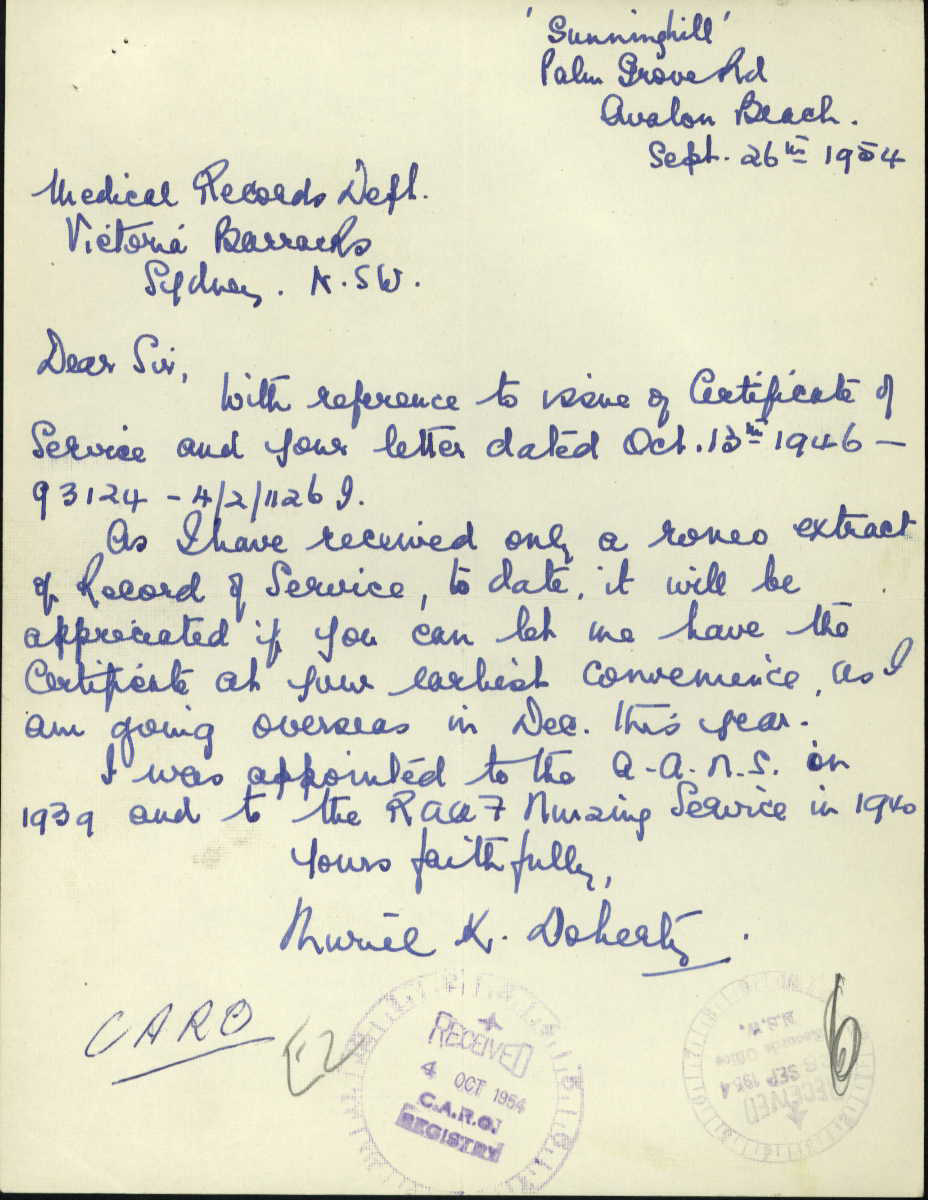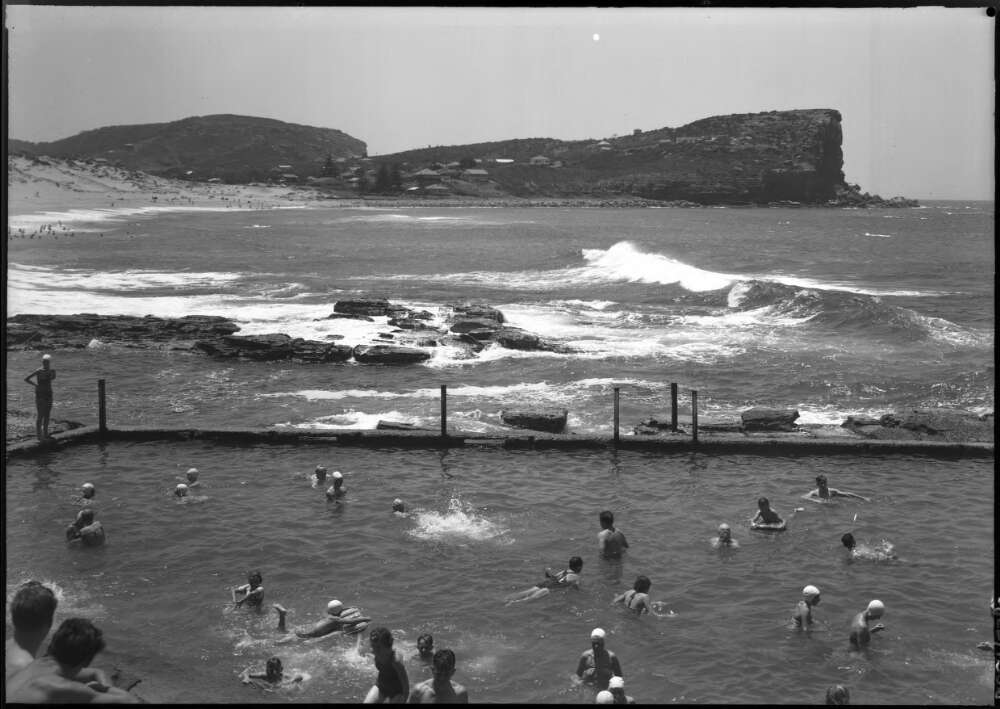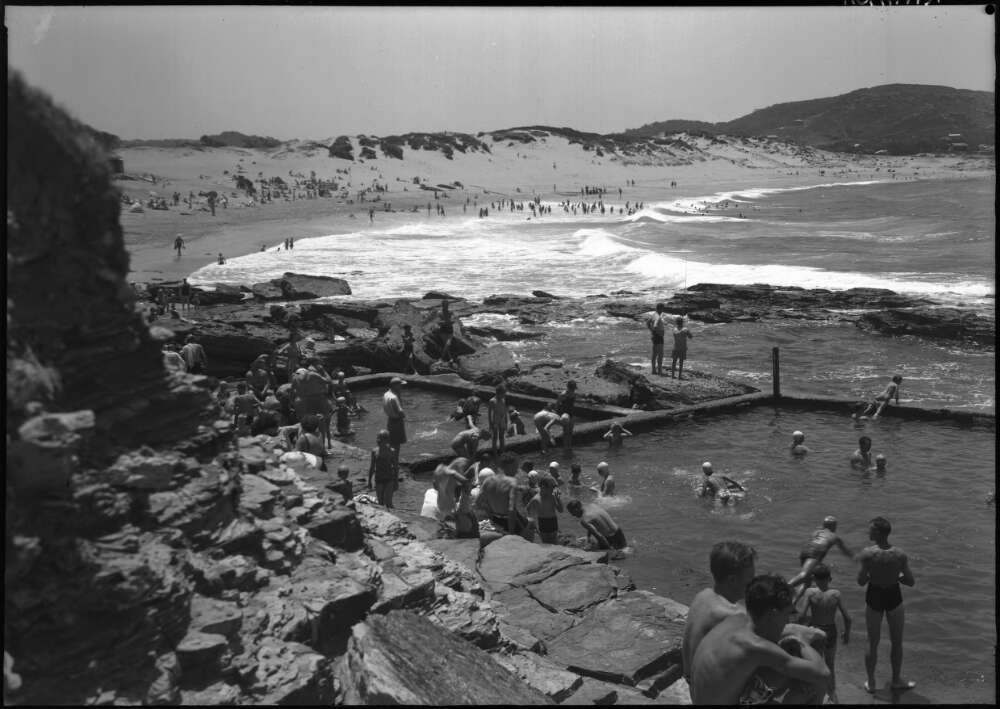That same year Muriel earned the St John Ambulance Association’s first aid and home nursing certificate. Her father was appointed to being a Justice of the Peace (JP) - a strange term in some ways on the brink of the outbreak of WWI:
CHIEF SECRETARY'S DEPARTMENT.
HIS Excellency the Governor, with the advice of the Executive Council, has been pleased to appoint the undermentioned officers of the Union Steamship Company of New Zealand, Limited, Sydney, to the Commission of the Peace for the State of New South Wales, viz.: —
Mr. Robert Knox Doherty and Mr. George Douglas Ross. J. H. CANN. APPOINTMENTS. (
1914, May 6).
Government Gazette of the State of New South Wales (Sydney, NSW : 1901 - 2001), , p. 2691. Retrieved from
http://nla.gov.au/nla.news-article226767076
From 1915-21 Muriel was a member of the Australian Red Cross Society’s No.6 Voluntary Aid Detachment, North Sydney, working at the Sydney, Mater Misericordiae and Royal Prince Alfred hospitals. AS can be read above, where she appears with her fellow North Sydney VAD's, tere are a few familiar surnames among these girls - the Littlejohn family, long associated with Manly - or 'Dempster', from early RPAYC days and sailing to and from Pittwater, as just two examples.
Voluntary Aid Detachments were established during World War I by members of the Australian Red Cross and the Order of St John. Members received instruction in first aid and home nursing from the St John Ambulance Association. Initially they worked without pay in hospitals and convalescent homes alongside doctors and nurses. After the war the voluntary service continued. Recruits were drawn from the local area by invitation from a serving member. During the World War II Voluntary Aid Detachment members were given more medical training, but they were not fully qualified nurses. Voluntary Aides worked in convalescent hospitals, on hospital ships and in the blood bank, as well as on the home front.
The Australian Red Cross began organising Voluntary Aid Detachments (VADs) nation-wide as part of Lady Helen Munro Ferguson's appeal "to the women of Australia" at the onset of World War I. The scheme followed the policy of the British War Office, and the British Red Cross Society, of which Australia was developing a branch.
A number of women had also enrolled in a Voluntary Aid Detachment in 1914 as part of the formation of the New South Wales branch of the British Red Cross Society. By August 1915, the Australian branch of the British Red Cross reported that Victoria and Tasmania also had Voluntary Aid Detachments. Recognised by the Military, the Voluntary Aid Detachments provided first aid, nursing assistance, comforts, domestic assistance and other supports for returned and wounded soldiers. In between the two World Wars, they continued their care for ex-soldiers and their families, raised funds, and moved into civil hospitals, homes and health associations. In 1928, they became a technical reserve of the Army Medical Corps, administered under the Minister of Defence through a Joint Central Council. - Reference: Australian Women's Register
In 1917 Muriel left Abbotsleigh to be a full-time VAD. This was the same year her cousin was killed in France. After the war, when soldiers were coming home, they brought with them that strain of flu that preyed particularly on the young and healthy - which must have been frightening for these young women, especially when the hospitals were full and places elsewhere were taken over to nurse the ill. It also would have been, for Muriel, an insight that would help her in 26 years time when she would once again be surrounded by thousands needing help.
Australian Red Cross Voluntary Aid Detachment members wearing protective face masks, during flu epidemic in Sydney, 1918. AWMP01102.021
"S.O.S. MOTOR CYCLES READY TO START IN FIGHTING THE INFLUENZA PEST
A number of motor cycles with side-cars, which are used for various work in the task of fighting the influenza epidemic, lined up outside the headquarters of the Administrative Committee, Education Department offices, ready to start on their errand of mercy. They all have the sign S.O.S. plainly marked on them. ... " CAN INFLUENZA BE PREVENTED? (
1919, April 13).
The Mirror (Sydney, NSW : 1917 - 1919), , p. 8. Retrieved from
http://nla.gov.au/nla.news-article136733822 The above and below clearer photographs, which appear in The Mirror report, comes from the State Records of N.S.W. - Title: Department of School Education - Motorcycles in front of the Education building entrance Bridge Street Sydney during the Flu Epidemic. Dated: c.1919 Digital ID: 15051_a047_003992 and Title: Nurses leaving Blackfriars Depot, Chippnedale NSW [during flu epidemic] Dated: April 1919 Digital ID: NRS4481_St6674
In 1921 Doherty returned to Abbotsleigh as a relief teacher and later that year, on November 5th, 1921 commenced her nursing training at RPAH. She passed her final examination in November 1925, winning the Sir Alfred Roberts medal for general proficiency, with December 21st listed as her finishing of training date and was registered on 10 February, 1926.
Muriel began as a charge nurse in the gynaecology ward, and was promoted within six months to sister-in-charge.
She sailed for England early in 1930:
Miss Muriel Doherty, daughter of Mr. and Mrs. R. K. Doherty, of Sydney, passed through Fremantle yesterday by the mailboat, on her way to London and the Continent, where she intends to spend some considerable time. During the vessel's !stay in port Miss Doherty was the guest of her aunt. Mrs. Doherty, of Claremont. and was met at the boat by her cousins. Woman's World (1930, February 20). The Daily News (Perth, WA : 1882 - 1950), , p. 11 (HOME FINAL EDITION). Retrieved from http://nla.gov.au/nla.news-article83817815
While there Muriel was engaged on a number of private nursing positions in Britain and on the Continent, and travelled extensively.
In 1932 she enrolled in the sister tutor course offered by King’s College for Household and Social Science, University of London. Returning, by request in September 1933 to the Royal Prince Alfred Hospital she was appointed a Tutor Sister and began a new phase of teaching more in line with her passion. What may have also hastened her return was another cable that may have been received regarding the passing away of her father, Robert Knox Doherty on July 22nd, 1933. The funeral was held on July 25th; her three brothers attending as 'chief mourners'. Sister Doherty, if catching the six week boat trip home must have boarded soon after she received news her father was gravely ill. On arrival home she went to work, as so many do when cope with the loss of a loved one:
Modern Hospital Training Methods - Instruction for Probationers
Matrons and nurses in leading hospitals abroad are keenly interested in Australia and Australian hospitals, and most eager to help students, says Miss Muriel Doherty, who recently returned to Sydney after spending 3 1/2 years gaining experience and studying in some of the biggest hospitals in England, France, Scotland, and Ireland.
The benefit of her added knowledge and experience will be passed on to the trainees at the Royal Prince Alfred Hospital when she takes up a position as sister-tutor there in October. appointment of a special sister-tutor will bring the R.P.A.H. into line with leading hospitals all over the world, where the work has KmSM proved of infinite value to trainees, doctors, and patients, and has led to the increased efficiency of hospital staffs. During her last year abroad Miss Doherty took the special sister-tutor course at the King's College of Household and Social Science at London University, and she is delighted to be going back to the hospital where she trained and was a sister before she went abroad When the new training system is in full operation probationers will have the advantage of two or three months' preliminary training before they enter the wards.
'This training consists of practical nursing,' said Miss Doherty in an interview, 'elementary anatomy and physiology, hygiene, bandaging, first aid, nursing ethics, elementary dietetics and the chemistry of foodstuffs, and also housework, of which all probationers do a good deal. Armed with the knowledge gained in these preliminary weeks, the probationer enters the ward with some equipment for her task, and is not bewildered or scared by what she finds there.'
The training should be undertaken in a model ward fitted up completely, and various treatments are given on models. Miss Doherty brought back from abroad a life-size model doll on which an amazing number of demonstrations may be given as effectively as on a real body. Even the hair can be washed and dried just as the nurses will have to do for patients. A similar baby doll is also included in the equipment 'Many probationers were so shocked and bewildered when they began their work in the old way that they hated it, and often gave it up when they might have been successful,' said Miss Doherty. 'Preliminary training prevents this waste of time and energy, and also enables the hospital to weed out unsuitable probationers who could never make good in the profession. It is important, too, for psychological reasons, and enables probationers to be put into the wards where they will do the best work at the beginning.' THE sister-tutor's work continues throughout each nurse's training. She gives revisional lectures after the surgeons' and physicians' lectures, and demonstrates practical work and coaches trainees for examinations. 'Our bedside nursing equals any nursing in the world,' says Miss Doherty; 'but this more systematic training will raise the standard of exact technical knowledge. So many tests and experiments are carried out in hospitals now that it is essential that nurses perform their duties with the most intelligent understanding of what is required of them. This fact is recognised all over the world, and I did the sister-tutor course along with students from Siam, Finland, CzechoSlovakia, and many other countries.'
It is estimated that £1000 may be needed to equip fully the preliminary training school at R.P.A.H., but in the meantime the training will be carried out as well as possible with existing accommodation. Sister Ring, of the Royal Alexandra Hospital for Children, is doing similar work at that hospital.Though finances have not permitted the founding of a real preliminary training school, the systematic training is given as thoroughly as possible and trainees have the advantage of having a trained sister-tutor. Sister Ring in 1928-9 did the same course in London as Miss Doherty has done. She had been tutoring prior to that date, and went to London specially for the course to ensure that trainees had the best possible instruction. Modern Hospital Training Methods (1933, August 30). Sydney Mail (NSW : 1912 - 1938), , p. 21. Retrieved from http://nla.gov.au/nla.news-article165961141
A recent arrival in Sydney from London was Sister Muriel Doherty, daughter of the late Mr. R. K. Doherty and Mrs. Doherty, of Woollstonecraft, who has been overseas for three and a half years gaining valuable experience, and has brought back with her from the King's College for Women, London University, a degree that is so rare in Australia there is only one other who has won it in New South Wales-it is the Sister Tutor certificate, the course for which is done in one year and is for trained nurses who have had sister's experience.
All the important English hospitals now have a training school for nurses presided over by a Sister Tutor. On Sister Doherty's gaining the Sister Tutor certificate with first-class honors, she received a cable from the Royal Prince Alfred Hospital, Sydney, where she trained, asking her to organise and take charge of a training department, which she accepted. She was then asked to choose in London all the necessary equipment for the instruction room. This was most interesting, for she inspected the very latest and wonderful inventions, and among other things secured a life-size model of a woman with each organ movable so that every kind of treatment for female diseases can be demonstrated. Of Interest to Women (1933, September 20). Northern Times (Carnarvon, WA : 1905 - 1952), , p. 6. Retrieved from http://nla.gov.au/nla.news-article74938735
In 1936 Muriel introduced a preliminary training school for nurses at the hospital. She transferred to Prince Henry Hospital, Little Bay, in 1937. During these years she was active in the New South Wales Nurses’ Association, treasurer in 1935 and a member of the executive council.
Miss Doherty was appointed a staff nurse in the reserve of the Australian Army Nursing Service in August 1935 - a position for which she was highly reccommended:
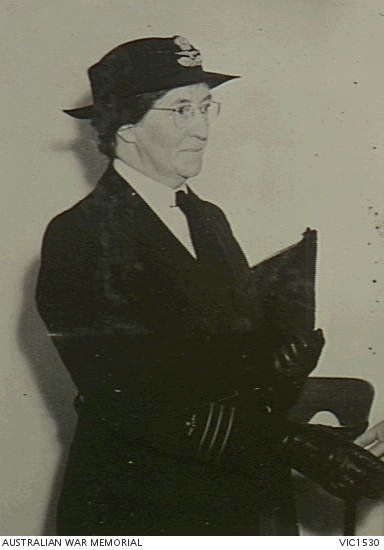
Following the outbreak of World War II, in October 1939 Muriel was called up for full-time duty.
On 16 September 1940 she transferred to the two months-old Royal Australian Air Force Nursing Service as matron of No.3 RAAF Hospital, Richmond, New South Wales, and principal nursing officer for No.2 Training Group and all units in New South Wales and Queensland.
The Royal Australian Air Force Nursing Service (RAAFNS) was established in July 1940. Personnel expanded from 45 in December 1940 to 616 in December 1945. Miss Margaret Irene Lang was appointed Matron-in-Chief and her staff's conditions of service were similar to those of the Australian Army Nursing Service. These nurses were originally attached to Royal Australian Air Force (RAAF) bases in Australia, and later served in New Guinea and the Pacific Islands. Wen the Medical Air Evacuation Transport Unit (MAETU), was established in 1944, the nurses helped with aerial evacuation of casualties and were involved with the liberation of Prisoners of War from Singapore and other areas.
Right: Melbourne, Vic. C. 1944. Portrait of Principal Matron Muriel Doherty, RAAF Nursing Service at Air Force Headquarters (AFHQ), Victoria Barracks.
Muriel's rank on entry was squadron leader, meaning she was the first nurse appointed to the rank of squadron leader in the Royal Australian Air Force. She assisted the Matron In Chief Margaret Lang to organise the new service in the region for which she was responsible.
Although this service was disbanded at the end of the war, in 1948 a peace-time service was formed and RAAF nurses served in the Korean War, the Malayan Emergency and the Vietnam War. They continue to attend to the sick and injured at RAAF hospitals.
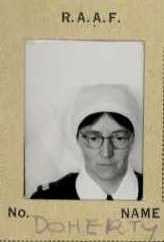 R.A.A.F. NURSES.
R.A.A.F. NURSES.Miss Doherty, Matron at Richmond.
MELBOURNE. Sunday.
Appointment of R.A.A.F. nurses under Miss M. I. Lang, Matron In Chief, were announced yesterday by the Department of Air. Miss Muriel Knox Doherty. Sister Clerk in the Principal Matron's office of the Eastern Army Command (N.S.W.) since October 1939, has been appointed matron of No. 3 R.AA.F. Hospital at Richmond (N.S.W.). and begins duty tomorrow.
Matron Doherty trained at the Royal Prince Alfred Hospital. She qualified as a tutor sister at King's College university of London, and upon her return to Australia was successively tutor sister at the Royal Prince Alfred and Prince Henry Hospitals, Sydney. R.A.A.F. NURSES. (
1940, September 16).
The Sydney Morning Herald (NSW : 1842 - 1954), , p. 4. Retrieved from
http://nla.gov.au/nla.news-article27948153
Doherty was promoted to principal matron (wing commander) in March 1943 and was acting matron-in-chief at Air Force Headquarters, Melbourne, in January-July 1944. Concurrently she was a member (1943-44) of a State government committee for reorganisation of the nursing profession (in New South Wales), and co-author of a textbook, Modern Practical Nursing Procedures (1944).
In 1944 those she had worked with and for began the process of ensuring her 'zeal' and passion for the work she had undertaken for RAAF was recognised with her being awarded the Royal Red Cross (First Class) in 1945 - some of these letters from her War Record file:
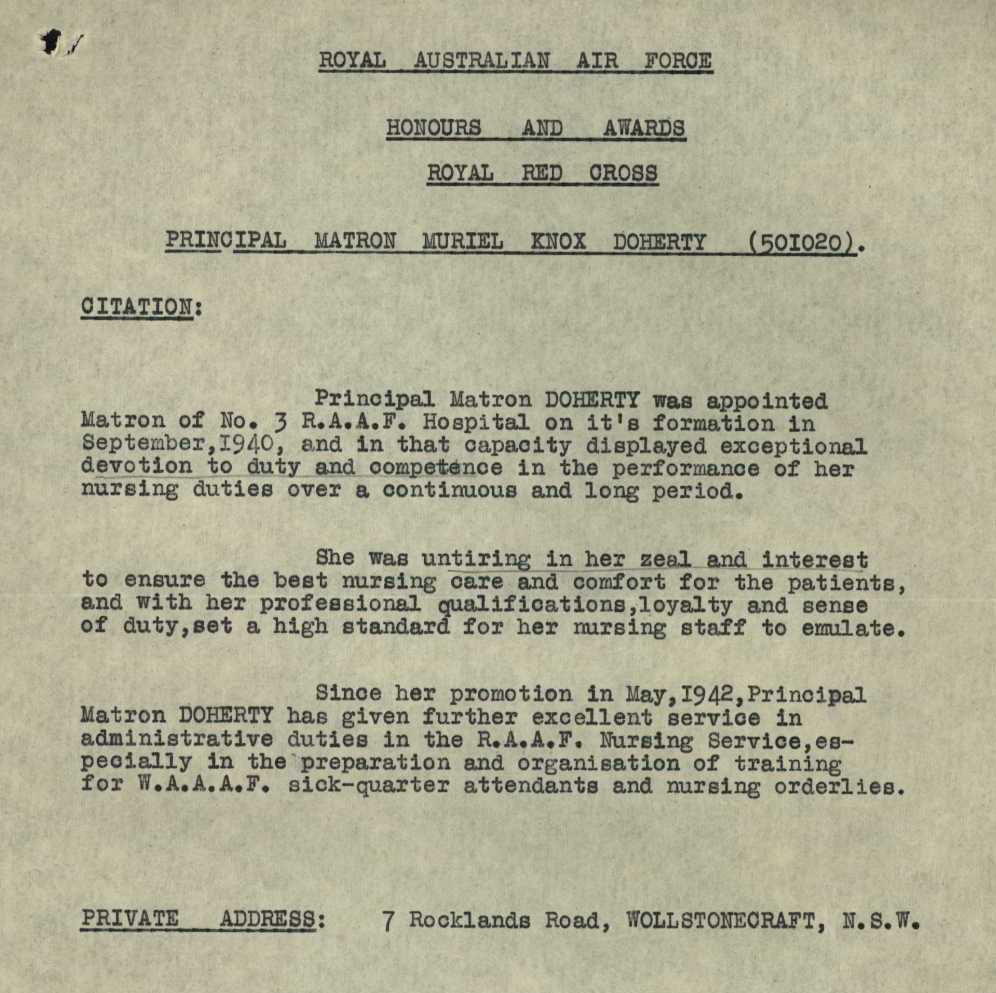
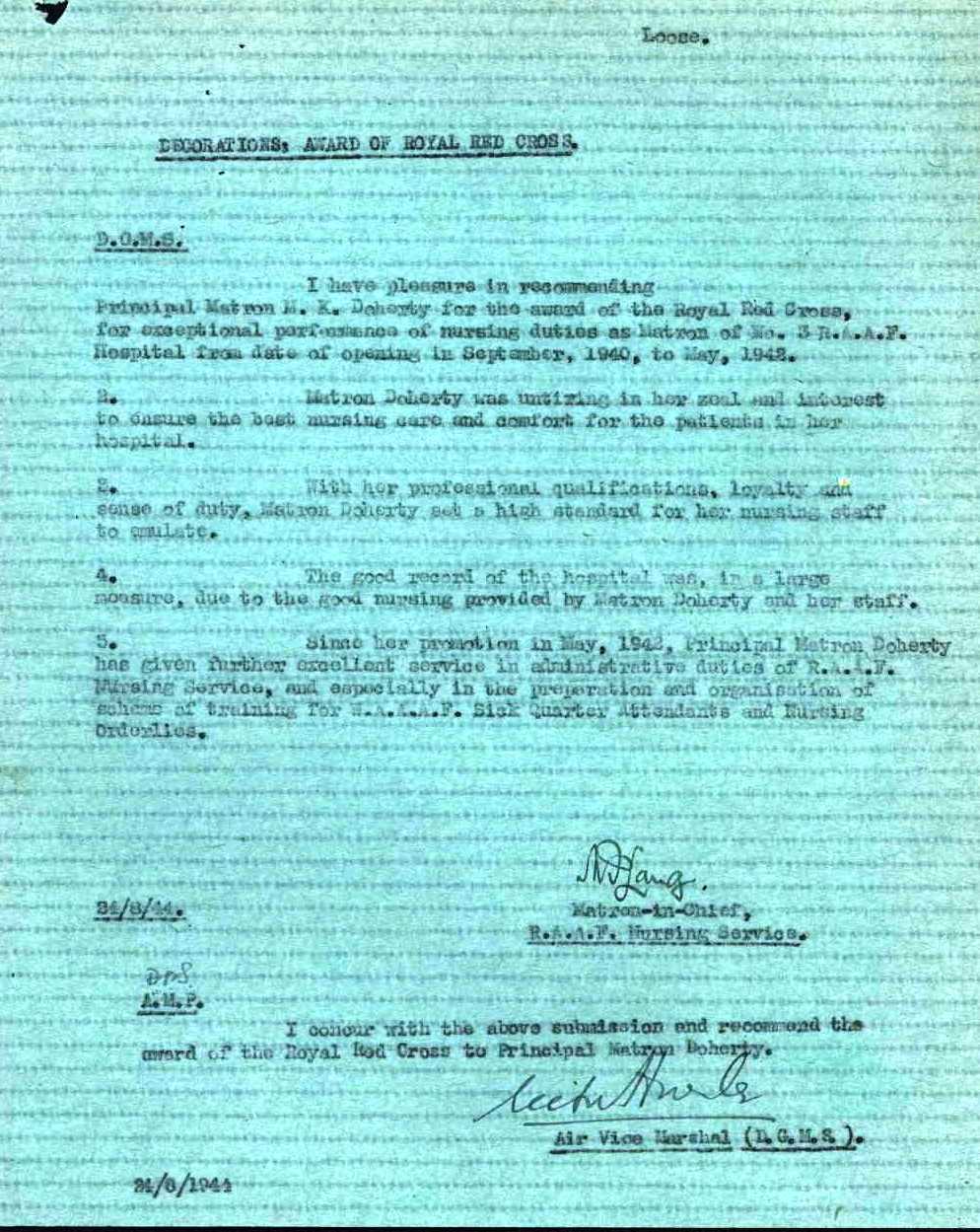
N.S.W. Matron Gets Royal Red Cross
SYDNEY, Monday: The only N.S.W. woman in the New Year honors list was Matron Muriel Doherty, principal matron of the R.A.F. nursing service. She received the Royal Red Cross.
Matron Doherty spent four years in Britain, France, Italy, Germany and Belgium, and is a member of the committee appointed by the Minister for Health (Mr. Kelly) to submit recommendations for the reorganisation of the nursing in New South Wales. N.S.W. Matron Gets Royal Red Cross (1945, January 2). Daily Advertiser (Wagga Wagga, NSW : 1911 - 1954), p. 2. Retrieved from http://nla.gov.au/nla.news-article144957873
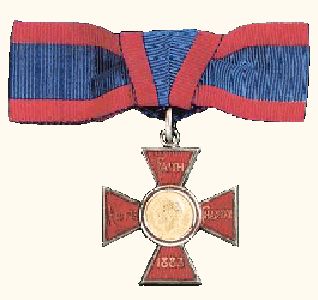
The Royal Red Cross is a military decoration awarded in the United Kingdom and Commonwealth for exceptional services in military nursing.
The award was established on 27 April 1883 by Queen Victoria, with a single class of Member. A second and lower class, Associate, was added during World War I in 1917.
The award is made to a fully trained nurse of an officially recognised nursing service, military or civilian, who has shown exceptional devotion and competence in the performance of actual nursing duties, over a continuous and long period, or who has performed some very exceptional act of bravery and devotion at his or her post of duty. This decoration had the distinction of being conferred exclusively to females until 1976. It is conferred on members of the nursing services regardless of rank. Holders of the second class who receive a further award are promoted to the first class, although an initial award can also be made in the first class. Holders of the first class who receive a further award are awarded a bar.
Recipients of the Royal Red Cross are entitled to use the post-nominal letters "RRC" or "ARRC" for Members and Associates respectively.
The badge for RRC is in the shape of a golden cross, 1.375 inches wide, the obverse enamelled red, with a circular medallion (now bearing an effigy of the reigning monarch) at its centre. The words "Faith", "Hope" and "Charity" are inscribed on the upper limbs of the cross, with the year "1883" in the lower limb. The reverse is plain except a circular medallion bearing the Royal Cypher of the reigning monarch.
Muriel was demobilised from the RAAF, at her own request, on 22 May 1945 that year. She wanted to get over to Europe and help in war-devastated Europe, applied to join the United Nations Relief and Rehabilitation Administration and was appointed matron to the recently liberated Bergen-Belsen concentration camp, Germany:
R.A.A.F. MATRON FOR BELSEN
U N.R.R.A. has appointed Miss Muriel Knox Doherty, of Wollstonecraft, N.S.W., formerly principal -matron of the R A.A.F. Nursing Service, matron of Belsen, the German prison camp which, under Nazi control, was the scene of the worst horrors of the European war. There are still 10.000 patients in Belsen.
“The selection of Miss Doherty from Applicants from all over the world is an outstanding tribute not only to Miss Doherty- but to Australian nurses," said the Matron-in-Chief of the R.A.A.F. -Nursing Service (Miss M. I. Lang) yesterday. "This appointment has been richly earned by Miss Doherty, who is noted for her zeal and devotion to duty, for which she was awarded the Royal Red Cross in the new year's honors. She is a keen educationist and an extremely capable organiser and administrator.".
Miss Doherty travelled recently to England. In a letter to Miss Lang this week, Miss Doherty said that, as far as she knew, she and a U.N.R.R.A. medical administrative officer would be working alone with a German staff.
Miss Doherty began her wartime nursing career as assistant to the principal matron of the Australian Army Nursing Service In 1939, when she helped to choose the first Australian nurses for overseas service. In September, 1940, she joined the R.A.A.F. Nursing Service and was appointed matron of No. 3 R.A.A.F. Hospital, Richmond, N.S.W., where she stayed until she was appointed principal matron, a position which she held until her appointment terminated in May this year. She interviewed most of the N.S.W; and Queensland applicants for the R.A.A.F N.S. She was sister tutor at Royal Prince Alfred Hospital from 1933-37, and filled a similar position at Prince Henry's Hospital. Sydney, until the war began.R.A.A.F. MATRON FOR BELSEN (1945, July 7). The Age (Melbourne, Vic. : 1854 - 1954), , p. 6. Retrieved from http://nla.gov.au/nla.news-article204023996
British troops entered the camp at Belsen on 15 April 1945 where they found 10,000 unburied corpses and around 40,000 emaciated and diseased people huddled together in filthy huts. The Germans had polluted the water supply and the prisoners had been without food and water for more than a week. The Colonel Commander, 102 Control Section, British Second Army described his first impressions of the camp:
The scene which met the first comers beggars description. There were approximately 50,000 people in the camp, of which about 10,000 lay dead in the huts or about the camp. Those still alive had no food or water for about seven days after a long period of semi-starvation. Typhus, amongst other diseases was raging. Corruption and filth was everywhere, the very area was poisoned. [3DRL/3958 AWM]
Twenty-eight thousand of the prisoners at Belsen died after their liberation. Many were moved to other European countries but many were also too weak to be moved.
Matron Doherty arrived in Belsen on July 11, 1945:
Erasing horror from Belsen by work of mercy
Radioed by HAZEL JACKSON of our London staff
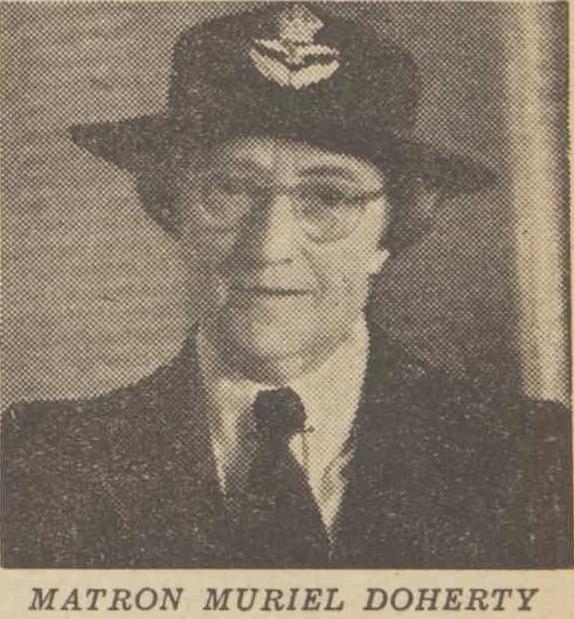 The taint of evil is being erased from Belsen. Where once the horrors of the Nazi regime had full licence, the work of mercy is going forward.
The taint of evil is being erased from Belsen. Where once the horrors of the Nazi regime had full licence, the work of mercy is going forward.
THE old Belsen hospital, one of the worst horrors of this camp,has been burnt to the ground. In the new hospital, formerly used for members of a panzer division quartered in the neighborhood, a team of UNRRA workers is repairing the ravages of the Nazis, healing minds and bodies broken by the "master race."
The present matron of Belsen Hospital is an Australian, Matron Muriel K. Doherty, Sydney. Formerly a member of the RAAF. Nursing Service, Matron Doherty left Australia in May, 1945, to work with UNRRA in Europe. As matron in charge of the Belsen Hospital, Matron Doherty controls a staff of 13 UNRRA nurses, 10 Latvian nurses, and 134 German nurses.
Since the majority of the patients do not speak English, language difficulties were alarming, but the problem was solved when Matron Doherty obtained her own interpreter, Irma Scholmer, a Hungarian girl, whose mother died in Belsen concentration camp, and whose father has disappeared. Irma's father once had a sanatorium in Berlin, so her knowledge of medical terms, in addition to her perfect English, makes her an invaluable personal clerk and interpreter.
The difficulties of dealing with German and Latvian nurses have been solved by placing each group under a matron of its own nationality, who takes her orders from Matron Doherty.
The UNRRA nurses act as supervisors. They are of all nationalities-Dutch, Belgian, French, English, Scottish, Canadian. There are three Australian girls, Sister Doris Delaney, Sister Valentine (N.S.W.), and Sister Vera Haughton (Vic). There are also two Australian women doctors, Phyllis Tewsley, Melbourne, and Leslie Bidstrup, Adelaide.
Untidy wards
"THERE are still some of the original Belsen internees in the hospital. In addition to this the hospital cares for any displaced persons awaiting return to their own countries.
"The hospital is run on the lines of any big general hospital," said Miss Doherty, "but it is very far from being a normal hospital.
"Most matrons would be horrified at the state of the wards.
"There are clothes all over the place. We are trying to do something about that by making bags for them out of the blackout curtains, but the patients all have their few personal possessions within easy reach.
"You see, these people are definitely not normal patients. For so long they have been living under strict discipline as slave laborers and worse.
"We simply must allow them as much individuality as possible, and do our best to reassure them.
"We still find them hoarding food, but there is not so much of that now. They love flowers and decorations, and the tops of the lockers are strewn with mats and embroidery wherever possible.
"The gipsies particularly love to spread flowers and leaves round their beds."
Nothing in the hospital is compulsory. The patients are not even forced to attend clinics, where both hospital patients and the inmates of the camp are cared for. For a long time mothers were afraid to leave their children at the hospital for treatment, but now they are bringing the children in quite happily themselves. Talking of the children, one casual sentence sharply emphasised the problem of the lost children.
"Peter is a lovely baby. Someone said they thought he was a Russian, but, of course, we can't really tell."
Miss Doherty is very pleased with the condition of the patients, and proud of the fact that they have managed to avoid any big epidemics.
Exactly six years from the day she was called up for the nursing service Matron Doherty attended an Investiture at Buckingham Palace to receive the Royal Red Cross, which she was awarded in the last New Year's Honors list.
It is the letters she wrote home during this year long duty, to her mother, and to her great friend Helen Budd Hetherington, Matron of the Royal Prince Alfred Hospital at this time, and as 'Community Letters' to be shared around on what was happening in Belsen, that we read of land and then a cottage being commenced at Avalon - her first home of her own. With her leaving imediately after being released from the RAAF in May and first mention a few months later, the timeline indicates Muriel Knox Doherty had made plans to have a place in Avalon prior to her departure.
A visit to the Sun Down Camp- Avalon - may have been the beginning:
AVALON, WOMENS' AIR TRAINING CORPS CAMP, SYDNEY, 1944-03-12. MEMBERS OF B SQUADRON SIGNALLERS DOING MESS FATIGUE PEELING POTATOES. FROM LEFT TO RIGHT ARE CADET WILLOUGHBY, SQUADRON COMMANDER PEGGY BROOKS, SERGEANT BILL, AIR TRAINING CORPS, FLIGHT COMMANDER DOROTHY FLETCHER, SQUADRON LEADER BOARDMAN, EDUCATION OFFICER SEDGEMAN AND AIRCRAFTMAN HARGREAVES. (DONOR J.S. ARCHBOLD)
Above: Avalon, NSW. c. 1940. Members of the Women's Air Training Corps (WATC) standing in front of the huts and the flag pole flying the RAAF flag, at the Sun Down RAAF Camp from left to right are: unknown; Mrs Nancy Bird-Walton (nee Miss Nancy Bird) NSW Commandant and Australian Commandant of WATC; Mavis Clarke; Jean Derrin; unknown.
Above: Avalon, NSW. c. 1940. Huts surround the parade ground of the Sun Down RAAF Camp where the Women's Air Training Corps (WATC) undertook some of their training, including the first aid hut on the right. Note the flag pole on the right is flying the RAAF flag. The WATC was formed in January 1940, a civilian voluntary organisation. The women were trained in a variety of skills including aircraft engine maintenance, ambulance first aid, signalling, and driving cars and trucks. Many members of the WATC later joined the Women's Auxiliary Australian Air Force WAAAF. (Donor M. King)
Muriel's letters from Belsen have been transcribed and digitised by The State Library of New South Wales and may be accessed in full:
Some extracts from these letters: - please note 'DP' stands for Displaced Person
[Page 1]
(Belsen No 2)
Community Letter 6
6 Belsen Camp
N.W. Germany
8.8.45
My dear Friends,
You will have received my last letter giving you details of the early history of Belsen – This will give you some idea of the conditions prevailing before & up to my arrival & I hope future letters will then give you a picture of present day conditions & progress. The early days of phase 2 were those of intense and exhausting work for the staff, and of miraculous change for the patients, Doctors, nurses, and all other personnel at the Camp were toiling from morn till night in the "wards" of the "Hospital blocks", the "Round House" & later the "Glyn Hughes" Hospital – Mr Winston Churchill’s famous tribute to the R.A.F. in the Battle of Britain might well apply to these courageous people – "Never before have so many, owed so much to so few".
I have met & talked with many of the original liberators and have been impressed by the modest way in which they narrate their experiences.
Feeding the victims of starvation & disease was in itself a colossal & & heartbreaking undertaking
[Page 2]
The moment food appeared, those who could, oblivious of their stark nakedness, staggered forward, gaunt spectres with arms outstretched, crying "Essen, essen". In fact, that cry was incessant in the early days.
When organised feeding became possible in Camp 1, the liberators were sometimes criticised by these people for the small quantities served. Many felt that they were better off under the Germans, when they had their watery soup, potatoes &
chunk of dry bread. They were not in a fit mental condition to appreciate the fact that it was highly nutritional.
I am not in a position, at present, owing to the many changes in Medical & Nursing Staff since the day of liberation, to discuss the scientific feeding of these starving victims or+ the nutritional disorders associated with this condition. Intravenous feedings were given and casein hydrolysate used for large numbers suffering from starvation.
Col. V.P. Sydenstricker, Head of the Nutrition Section, Health Division, UNRRA, and Dr. C.N. Leach of the
[Page 3]
Rockefeller Foundation, visited the camp shortly after liberation. It was a result of this meeting that Dr. Meiklejohn was sent out to advise on nutritional problems.
Dr. W.R.F. Collis, Prof. of Pediatrics, Dublin University, who was in charge of the children’s Hospital here, has written two papers on the subject of nutrition here at Belsen, which he is sending me. He recently accompanied the last group of original camp 1 children to Sweden and was unable to discuss the matter before leaving.
Strangely enough there appears to have been little evidence of vitamin deficiency as judged by the appearance of scurvy, beri beri or rickets. Mouth, gastro-intestinal & skin infections, pulmonary tuberculosis, famine oedema and pressure sores were, however, prevalent. Louse borne typhus was raging – The death rate was high – A board on the outside of the each "block" indicated the number of deaths during the day. The bodies were placed in the cellars and collected in wagons at 6 p.m.
Nursing conditions were primative, and the "wards"
[Page 4]
grossly overcrowded. The odour was terrible. There were few, if any bedpans; dysentery & diarrhoea were rampant. The patients were dehydrated & exhausted. Improvisation was carried out to the nth degree. The stronger, still haunted by the fear of starvation, hoarded what they could among their bedding – some still continue to do this. It took a considerable time for the inmates to regain confidence & appreciate the fact that when they had eaten the food provided, another meal was forthcoming in a few hours. The cries of "essen, essen" were still heard, though food was plentiful & patients dying from over-eating.
By May 21st 1945, 13,000 hapless victims of Nazi brutality had died from starvation, overeating, typhus, pulmonary tuberculosis, dysentery & other diseases. Thousan since liberation. Thousands of others had been brought back to health by the devoted & untiring care of those privileged to look after them.
The return to health, both mental & physical, was miraculous & rapid for many, particularly those who had but recently entered the camp.
[Page 5]
The organisation of the camp was amazing – Accommodation had to be found for those not admitted to Hospital & for patients discharged from Hospital – Nationalities and relatives were as far as possible housed together.
Information offices were inaugurated to assist D.P.s to trace relatives & friends – Remember, all records were destroyed by the Nazi S.S. Guards before the Camp was handed over – and during the truce.
Food ration cards had to be issued, registration carried out – A steady stream of transport was kept moving. Army ration & ordinance stores, laundry, cookhouses, food distribution centres, dispensaries, First Aid rooms were set up. Sanitary squads had much to do. Ambulance services never ceased. Grave diggers were constantly at work. Kindergartens & schools were opened. Polliasses, clothing & footwear began to appear, being commandeered from the German population.
Typhus "blocks" were surrounded with barbed wire.
[Page 6]
Liaison officers of many nations began to arrive. Welfare officers worked unceasingly – Few of the personnel in such close contact with the victims of typhus developed the disease. Some 27,000 souls began to assume some degree of normality.
The first work was to relieve starvation, restore to convalescence those who were fortunate enough to recover and to bring such comfort as was possible to those to be destined to lead a life of invalidism or whose days were numbered.
These peoples of the concentration camps were free & few restrictions were placed upon them. They were not normal in mind or body and were ready to resent any control as being reminiscent of Nazi Kultur.
They were fed & clothed & housed. They came & went as they liked, their registration cards being the only thing necessary to enable them to pass the guards at the gates. They had lost all moral sense – Pillaging was rife. They raided
[Page 7]
farms, houses, shops, villages & were frequently joined by large numbers of D.P.’s who had been used as slave labour and who, on liberation, downed tools & either joined the marauding bands or set up more or less organised colonies throughout the land or wandered into D.P. camps in order to be repatriated. They stole the sheets, quilts, blankets in fact anything they could, for in their opinion they were perfectly justified in doing so. After all the Germans brought them into the country & must take the consequences. There were shootings but these are now under control owing to a strict order regarding possession of firearms.
These people whose very existence had for so many years depended on astuteness, quick witedness & physical strength, could hardly be expected to return to normal community life in a normal manner.
There were Jews & Christians, Czechs, Romanians, Poles, French, Dutch, Belgians, Russians, Germans
[Page 8]
Gipsies, Austrians, Italians, Danes, Norwegians, Yugoslavs, Greeks, Hungarians – One only has to walk round the cemetries to see the nations represented.
Thousands were repatriated as soon as possible if fit to travel, in a 1,000 bomber shuttle service – Thousands remained, either because their countries would not have them or because they did not wish to return to the land of their birth. Numbers left the camp independently.
And that brings me to the time when I arrived at Belsen Camp on July 11th 1945.
I must close now, for my tasks are many & my work arduous – UNRRA’s work now is to transform an acute emergency & improvised Hospital into a well organised, hygienic institution and I am in my element.
Best wishes to all
M.K. Doherty
[Page 11]
Belsen Camp
N.W. Germany
6.8.45
My dear Mother
This will not be a very interesting letter, because I am so very busy, preparing my mess for 40 people and arranging to take over the Hospital on 8/8/45. Two most interesting letters from you but no mail now for one week & I do look forward so much to it. Fancy Sydney getting so excited about my appointment – you seem to have had a busy time with the Press. Aunt Kit wrote & told me the news. Am looking forward to the newspaper cuttings too – no papers have yet arrived for Aust. for me. I wrote Budd of details of getting our mess in order. The second block of flats which was to be cleaned & furniture sorted today – was broken into last night & a good deal of furniture taken. You can’t turn your back for one single minute here without losing something. Had the Garrison Engineer up today – German – He & I walked round and I made him understand in my bad German that various windows, basins, door handles, electric lights etc. etc required mending – "Kaput" seems a good word for "No good" or "broken" – Belsen Camp is changing rapidly – thousands coming & going all the time – Terribly interesting.
Have posted Letter No 1 describing the beginning of Belsen after liberation, to Budd – rather gruesome for you perhaps – will try & write it as it was when I came & is now, but that will take time. V. difficult to finalise anything & after weeks of battling to get some sort of transport to take me round the long distances, found that "a driver had been looking for me all the morning" – He was without a car!! So what earthly use he is. I know not.
[Page 12]
Haven’t had a letter from Norah yet in reply to my note telling her where I am. Tell Kathleen I expect her to see the Community letter, as I can’t manage to write individual ones yet.
Lovely weather here – The D.P’s take advantage of helping themselves to much of the potatoes & vegetables in the German fields – They also enjoy stripping the apple trees which line the roads!! After all the Germans brought them here!!
Another interruption to take receipt to china, cutlery etc – Must stop am very well & enjoying getting out of the muddle!!
Give my love to all & much for you – Hope plans for Avalon progress – Am looking forward to a holiday there when I return.
Take care of yourself,
Lots of love
Muriel
Envelope addressed to:
Mrs R.K. Doherty
7 Rocklands Rd
Wollstonecraft
New South Wales
Australia.
Belsen, Sunday 9/9/45
My dear Mother,
[Page 69]
Budd has told me that the builder says the house will be expensive but I have told her to proceed – I want it badly & we can sell No 7 while the boom is on & recover the money invested in the new one. We may have to reduce the size of the two biggest rooms – Aunt Laura’s sitting room is 17’ x 14’ I think.
We are rapidly sending the D.P.s home but the Poles who are in the majority will be with us for sometime I fear – We don’t know what the future holds for this Camp really, although we expect 20,000 for the winter. How they will exist cooped up in the intense cold with coal shortage I know not. Warm clothes very short here now & consequently we are looking at our blankets. Two pts? Diphtheria went out for a walk with a crowd of their girl friends yesterday & were away several hours before being located!!
Hope you hear from Ian soon & that Flo is still able to stay at that home. Your tree planting at Avalon sounds good. What a picnic we’ll have when I return.
Was interested in the local news – Mrs P. has two daughters on her hands now hasn’t she? I forgot to say I recd. Your Aug. 26 airletter on 7.9.45. Good wasn’t it. You will miss "buttons", fancy 4 years 11 mth. You will miss chevrons for your coat. Papers very irregular & no wireless in our mess so we are not uptodate with the news. Believe some arrests in Ruhr – "our I. friends".
Much love
Muriel
Envelope addressed to:
Mrs E.M. Doherty
7 Rocklands Road
Wollstonecraft
New South Wales
Australia
The Ian mention in this letter is her brother, who is trying to get home from Tokyo, after being a prisoner of war since 1942, taken at the Fall of Singapore.
Sgt. Ian Doherty Dr. F. W Buddee has received advice that his brother-in-law. Sgt. Ian Doherty. has been recovered from a prisoner-of-war camp in Tokio. Sgt. Ian Doherty (1945, September 18).Glen Innes Examiner (NSW : 1908 - 1954), , p. 4. Retrieved fromhttp://nla.gov.au/nla.news-article185408284
From his War Record:
Ian was married prior to embarkation for Singapore, and living at Mosman. Alister also served. Robert, their elder brother, had died young, a few years after his father. He and wife Sally did have a daughter and son before he passed away.
Belsen. Sunday 9/9/45
My dear Budd,
Was having a quiet day off & wishing some mail would turn up, when someone produced 9 letters unexpectedly! Two from you, airletter 1/8 & air mail 7/8/45 both most welcome & filling in gaps. I still wonder where Barbara is or rather what job she is doing in Bathurst. The planting at Avalon sound thrilling – I smiled at the enclosed letter from Avalon Asn.
You should see the mushrooms the D.P.s eat here – terrible looking "toadstools" with bright yellow spots!!
Mogo sounds attractive, but the cottage at Avalon interests me more. Cut down where you think fit but preserve essentials – and do not quibble over a hundred or so. Use my bank money. You can (3 lines crossed out and [indecipherable]).
Have just had 40 cots made for my K.G.V ward. They say there are over 500 "getting ready" for admission. My G. staff could do better work – Passive resistance is v. useful at times.
We have several Aust. Dr. Bidstrup & Sister Wilkinson S.A. Dr Tewsley Vic. Miss Delaney N.S.W. (2 lines crossed out and [indecipherable]). Both Drs are females. Haven’t heard where Miss Butler is, was ages doing nothing at Granville tr. Centre, I hear. H. Mitchell in Austria or should be, had one letter about month ago.
Ink is difficult to get, but will try London.
Give my love to all enquirers & don’t do too much & look after your eyes. We’ll never write a book if you don’t. Much love
Muriel
Envelope addressed to:
Miss H.B. Hetherington
Royal Prince Alfred Hospital
Missenden Rd
Camperdown
New South Wales
AUSTRALIA
Belsen. 19.9.45.
My dear Budd,
Although only Wednesday I must send you a letter to tell you that your lovely birthday cake & the lease lend teapot and tea arrived yesterday. The calico cover & every stitch was intact in spite of the fact that it had been readdressed from London to a unit I’ve never heard of. The tin was battered & burst, but the delicious cake unharmed & enjoyed by eight of us for supper – or rather a small taste was. It carried beautifully and ever so many thanks. The teapot was dented on the rim which can be adjusted and is most welcome.
Yesterday came your 4/7 which although air mail only had 6d stamp & did not arrive in London till 4/9. Many thanks for the birthday wishes. That picture of me was certainly terrible in the Aust. Hosp! The negative should be destroyed. Would you ask Miss Frazer & tell her I’ll sue the Commission if she doesn’t!!! Also give her my kind regards.
The tree planting at Avalon sounds marvellous, what a day you had and how lovely it will all be to return to. Sorry someone is interested in our firewood but until we get a fence I suppose that will happen.
[Page 91]
Our Dutch cook supervisor who has been to Aust. sent me the paper with the story of the Aust. nurses from Singapore & Borneo – ..... it’s terrible –Kramer’s trial is on today and our S.S. man, post typhus, who has been under double guard in Hosp: has gone up – He’s a brute, six murders alone to his credit – Our curfew is 10.30 pm now and all guards have been told to "shoot to kill" any persons who are found committing any crimes or tries to evade arrest. We must have special pass each time we are out after 10.30 pm, but don’t think that will be necessary somehow. Daylight is fading early & there are so many "shootings" about – we always have one or two in Hosp. under guard – Don’t worry about me I’m not taking any risks.
Once more many many thanks for lovely cake which is the first parcel to arrive.
Take care of yourself.
Yours sincere (absent mind) Much love
Muriel
Don’t use address on back – Use London one
Envelope addressed to:
MISS H.B. HETHERINGTON
Royal Prince Alfred Hospital
Missenden Road
Camperdown
New South Wales
AUSTRALIA.
FROM
Miss M.K. Doherty
UNRRA Personnel
618 Detachment
Mil. Gov:
B.A.O.R.
Page 92]
Belsen – Sunday
23/9/45
My dear mother,
Three letters unanswered from you dated June 27 Aug 6 & Sept 10 – The June one was addressed to the APO 757 and had been to New York City, and opened by Censor, but apparently met with his approval. Tonight is our first cold night and I am wondering how I’ll write when winter is really here. The electricity & water are off each day at midday, and every evening 7-8 or longer. I have one candle by which I am now writing but wonder how we’ll manage in the winter –
You must be overjoyed to have that cable from Ian, I wonder who Fuller is? Miss Lang said RAAF nurses were doing a lot of evacuation & would go to Tokyo & Singapore so expect they will bring prisoners back as they had been given special instructions for feeding them in the air.
Poor old Flo – sounds as if she’d had a stroke or two. Do hope they can keep her in the Hospital or home rather.
Four letters from Kit since I left and one lovely parcel yesterday – soap, powder & barley sugar – one jar smashed to atoms, so had to throw it out – ground glass not too attractive. Mail seems to be coming through now much better. The plantings at Avalon sound fine – It won’t be long before I see them, I expect. It’s 4 months since I left now and there are sorts of vague rumours about UNRRA’S future, which seems to be almost in the melting pot at present.
Was interested in the latest engagement at Canberra; quite a good idea, methinks – The packet I asked you to hold only contains papers I didn’t want in London, I think. You can open it, but I don’t remember anything of interest in it.
The third community letter was posted the day before I left London I think – Since then I have sent No.4 (in two envelopes by air 23.7.45) and Belsen No 1 (addressed to Budd you may not want to read it 29.7.45) Belsen No 2 to you 18. Aug, No 3 Sept 2nd No 4 16.9.45 – all by air, so you should have some good reading.
[Page 93]
I hope they do go by air. Long letter from Fam recently – and full of news – also many others write to say they enjoy the copies of the Community letters.Don’t use address on outside of this it is only official – new order out – B.A.O.R stands for British Army of the Rhine instead of previous B.L.A. B. Liberation A.
The Italians went home last week & the Russian soldiers commence next week I believe. We are mostly left with Poles, with a smattering of other nationalities who cannot or do not want to return to their own country.
I have just lit the bath heater, wood & a few crumbs of coal, but makes quite a good bath, if the fuel lasts. Coal very short, but of course, plenty of forests in Germany, so wood should be alright – but unfortunately only electric stoves and steam heating in Hospital & our Mess. Our international mess had a Brazilian (UNRRA) tonight for tea.
Take care of yourself – Your letters are most interesting
Much love
Muriel
Envelope addressed to:
MRS R.K. DOHERTY
7 Rocklands Road
Wollstonecraft
New South Wales
Australia
Page 128]
Belsen. 8.10.45
My dear Mother,
How the time flies, but expect you are so busy either preparing for or celebrating Ian’s return that you haven’t noticed – No letter again from you, nothing since 21/9/45 – and some before that, missing also I think – A number of Budd’s missing also, but one last week saying foundation stones at Avalon probably going down this week – I can hardly believe it, I am so excited about it.
The autumn tints are lovely here – crimson & yellow maple & birches and red squirrels among the red leaves in the woods. Today is cold & bleak, lantern on 4.30 pm to write by. Had an exhibition of patients work this week, some lovely things made out of nothing – I’ve ordered some for you, but will not post them I think – If only UNRRA would sent materials etc for them to make up it would be something, but we’ve not received a thing since we took over.
The BBC called this week with cable from Aust. requesting that I make a 13 min: broadcast on the Pacific service. Have written to London to ask permission – you’ll probably hear when it is to be, later – if they consent.
Life goes on much the same – cheesemaking in the wards flourishing, with the precious extra pint of fresh milk we get for the "tbs"! – The smell was so bad yesterday that we had to stop it & now those who want cheese will have it made in the kitchen – "quirk" [quark] they call it; cream cheese.
I went to the Luneberg trials one day – Kramer of Belsen "fame" & his henchmen & women – Am writing a separate community letter describing that – too much for air letter – but very interesting –
[Page 129]
Budd said her father was very ill in Hosp: hope he is better by this.
Made a nice cup of tea today in the Moss Vale lease lend teapot & Aust. tea & milk – Am wearing your mittens at present also! Lovely & warm.
We have 21,000 DP’s in this camp at present & 27,000 in a nearby one – nearly all Poles too – The Russians are driving the Germans out of Poland, Czecho: & Eastern states at ½ hrs notice & thousands dying on way & in trucks arriving in Berlin.
The whole world is still in an upheaval – I wonder how things are going on in the Far East. I’m sure they’ll have trouble with the Japs.
My hands are so cold, I can hardly write – I left this and it is now 8.30 pm & the lights are on again.
Good bye, take care of yourself
Much love,
Muriel
From:
M.K. Doherty
UNRRA
618 Det: Mil: Gov:
B.A.O.R.
[Page 130]
Belsen. 12.10.45
My dear Budd,
A very hasty letter this time – it’s Thursday but I’ve just heard that my investiture is to be on Tuesday 16/10/45 and I’m flying over on Saturday morning – Leave Belsen tonight for Spenge, UNRRA HQ. near Herford & Bad Oeynhausen and "take off" from there – Am quaking at the knees and trying to organise myself in a hurry. Two lovely letters from you today 9/9 – with the plan and 18/9 Airletter. Also lovely parcel, jellies, brown sugar, barley sugar. It’s just like Xmas undoing them – oh yes, cake of soap also – My investiture just six years to the day since I was called up 1939. Will try & buy chevrons in London & new bit of ribbon – wrote to Farma & Finlow asking them to accompany me if I can have visitors – it’s all been done by phone as haven’t seen invitation – Have all new things shirt, collar, tie, gloves, stockings, shoes & skirt which I’ve been keeping. Tunic quite new & will have pressed if poss. In London. Beret at present trying to clean the band without much success but no coupons for new one, so it will have to do – How I do wish you were here – The plan is thrilling and as long as the windows are low enough I’ll be perfectly happy in my old age.
Letter from Mother today also – She’ll be very excited now – hope its not too much for her – Sorry your Father had a fall – your last letter said pneumonia, what you were hoping to avoid – You are much too busy – do take care of yourself –
I can’t believe the house is to be finished before I return – what fun & what a holiday we’ll have. I am very glad you decided on the plunge" and very relieved that you have withdrawn from "China Mission" –we’ve more than we can cope with already – My thanks to all for the dictionaries which will be very helpful – we had an exhibition of pts work last week good but very limited owing to lack of any materials from UNRRA. Believe it’s going to be shown in London next week.
Glad you enjoy the letters. Let me know which community letters you’ve received and I’ll know which are missing – to date have written Nos: 1,2,3,4 (in 2 envelopes) + Belsen 1,2,3,4,5,6 latter posted yesterday & is a description of Luneburg trials which I attended.
Must attend a Mess Meeting now as I’m President – will send cable from London if I can – will be very rushed visit I’m afraid – Will now go & peruse the plan again after meeting.
Much love
Muriel
AS well as discussing the home construction at Avalon - the above quick letter speaks of Muriel receiving her Royal red Cross, First Class, from the King of England - the letters after this in full - with another 'celebratory theatre' visit!:
London. 15.10.45
8.55 am in P.O.
Sent cable to you because thought Mother might be out when delivered & they don’t leave it. M.
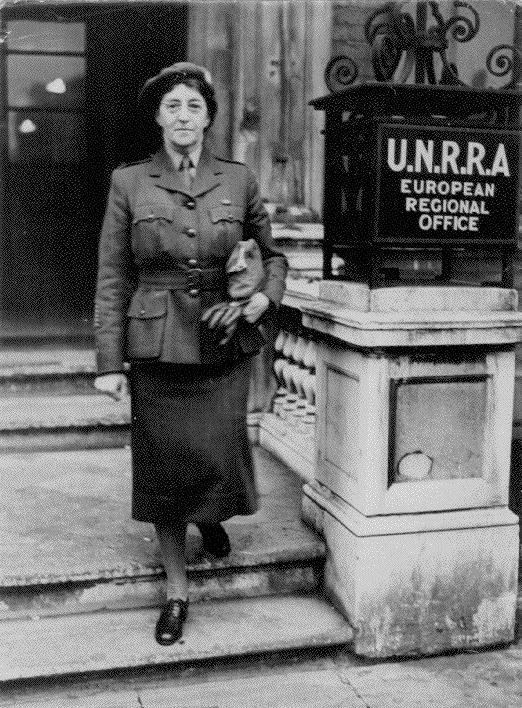
My dear Budd,
I have just sent you a cable re investiture. All done at short notice to me. Flew over, arriving Croydon 1 p.m. Saturday 13th May good trip 2 ½ hours –Arrived our H.Q. no one there of course at 2 p.m. No message, no accommodation arranged etc. I reported to the office just in case & the very obliging porter told me there was an UNRRA hostel just round the corner in Devonshire Close – he rang & they had a spare bed in a three bedded room – so I was lucky – impossible to get accommodation in London and food shortage going to be serious – any way, bed & breakfast is better than nothing & queue up for other meals – Rang Farma & found she was at Ambleside – rang her hoping she would come down a day earlier, but she’s not returning till Wed: - so that’s that. Finlow (Almoner St George’s) trying to get off & come with me but very busy – Don’t know time yet but will add to this letter: Feeling shaky & quaky & wishing you were here to see me through. Spent yesterday a.m. with Finlow & for lunch but don’t like having meals with people here as rations so small. However, I took some German apples, pears & some chocolate I’d saved & she was very pleased.
Am going to make enquiries re my future position here, whilst in London – as am not satisfied. Believe Miss Haynes from Concord is in the office at present with Miss Udell – But as the office doesn’t seem to have any say in what goes on on Continent, I just wonder what she finds to do.
17.10.45. Well, it’s all over & I’m the proud possessor of the medal & the Kings handshake. After commencing this I reported to Miss U. Monday a.m. to find UNRRA had booked for me but left the message at another office (to which I had no reason to go). Talked in office during a.m. whole position v. unsatisf: They have 3 senior adm: officers including myself & no jobs for them. Very vague suggested there might be nec: to suggest to us we go to other spheres!!
Also UNRRA may be committed to looking after the Germans also – I said nothing – will wait & see Nov: 1st is date on which they are supposed to sign final contract. Would not consider Far East at all & hope something develops re Coll: Nursing.
You’ll be dying to hear of my visit to the Palace – Well, I had arranged with RAAF to contact Miss U. to save time. She sent signal which hadn’t arr. when I left Belsen – But she was in phone contact with Miss C. & mentioned it. One receives a "summons" – Well on Monday last, day before investiture summons hadn’t arrived – and no one had done anything about it, although Miss Haines had hers for Oct. 30th which was strange to me & letters do not go astray in London. I rang RAAF H.Q. they contacted Palace, and at 4 pm I collected a second summons & two invitations & rushed back to sew chevrons (which I’d bought) on my suit & new RRC ribbons. At 9.15 am we set out (Miss Udell & Finlow as my guests) by taxi for the Palace where the crowd had commenced to gather. We were driven right up through the inner courtyard to the entrance & red carpet & here we parted. I went inside, met by two officials in scarlet swallow tails & was passed from one flunkey to another (still in their
[Page 133]
Khaki home guard uniform) to the ladies cloakroom – Having sampled the Palace soap & dried on fine crested linen, I powdered my nose and descended the steps & up to the other side, past the audience chamber to a huge reception room. It was now 10 am & about 200 recipients gradually gathered there (the VC’s etc were separate) & finally received instructions – 3 other nurses with me. Finally all in queue & moved slowly – until we entered the hall where all spectators were seated & the King was standing. Finally I was announced, stepped forward, turned left to face him, curtseyed, stepped forward, had medal pinned on my chest (hook previously placed there) The King asked me how long I’d been with UNRRA – shook hands stepped back, curtseyed again turned right & walked down ramp to another "station" where the medal & hook was removed, former placed in lovelys leather case, inscribed in gold on outside "RRC. 1st Class" handed to me & I was passed on. Perfect organisation. We all then stood behind guests & saw the rest of the procedure. I received mine at 11.50 am. They commenced about 11.am. & I was about halfway – Papers say over 300, one of largest – Lovely soft music all the time from orchestra & a wonderful experience. But did wish you were in the audience – will write full description in community letter. Took them to lunch Gorringes, long interview with "Information" & a Press interview arranged (re Belsen news) for Thursday 3pm. & probably a broadcast on London stations – It’s awful – I loathe this publicity as you know.
Collected letter from you & Bank statement for which many thanks. Didn’t know your Father was in G.H. missing letters probably told me – Collected suitcase after much swearing that I wasn’t going to use any of the things on England or eat the goods.
Went to musical play "Sweet Yesterday" last night with my two guests – My party, wore my new brown shoes you sent. Interested in Public suggestions re Nat. Coll. Nursing. Six years yesterday day of investiture since I was "called up". Now quite ready to retire to Avalon – You should have cheque from Dymocks quite soon – No sign of book yet. Forgive haste am very busy rushing from one Dept. to another & want to do a bit of shopping for Belsen – I return on 20th. Much love – Muriel.
Page 134]
London. 17.10.45.
My dear Mother,
You will have received news that my investiture took place yesterday & will be looking forward to news of the event. I told Budd of the difficulties regarding arrangements & how I finally received a new "Summons" to attend at 9.45 am 16/10/45. The evening before, as you can imagine was taken up pressing, shoe polishing, manicuring & general rejuvenation – Having carefully dressed in the a.m. with care and joined by my guests Miss Udell & Babs Finlow, I called a taxi & off we set for the Palace – The crowds had begun to assemble as we drove in the main gates, through the archway to the inner courtyard where the queue of guests was already forming – I was passed on through the portals & directed by a scarlet coated official to the ladies cloak room up a flight of lovely stairs & through a large anteroom where a maid assisted me further. Having sampled the Palace soap & dried my hands on fine crested damask, I was told I did not wear my gloves but could carry them or leave them there. I chose the former for companionship & sallied forth down the broad staircase again, this time to mount another flight opposite en route to the assemble room. Lovely Greek goddesses and crimson carpet helped me on my way as did the flunkeys still in the uniform of the Home Guards (Khaki). Passing through halls lined with cases of glorious old Spode, Doulton & the like I arrived in what I would call the "Victoria" room – lined with enormous oils of every phase in the lady’s life – Here the recipients began to assemble, Navy, Army, Air Force, Canada, N.Z. Aust. S. Africa, Bermuda & of course G. Britain – These men who had led armadas & armies into battle, showed signs of nervousness from time to time and all wore ribbons of many decorations & campaigns.
That was about 10 am and we stood (or sat) there until 11.30 a.m. during which time we were instructed in procedure by a court official of unknown origin. The men first & then we four women received a special word of advice - Two QA’s (one N.Z.) and one nurse from Malta in uniform of St. J. Amb: The elderly QA Matron, Miss Graham, led the way, followed by myself & the other 150-200 recipients in the room. The 3 Indian V.C. one G. Cross & Knights etc must have assembled in another room, for they of course went before us. It was a pity we couldn’t see that part. Then we left ‘Victoria’ behind and slowly moved towards the audience room (not sure of its correct title) where all the guests were seated & the King stood accompanied by his various army officials – He was in uniform of an Admiral of the Fleet, looked thin & is greying but nevertheless was "Our King" – Each recipient’s name was announced loudly & we moved up one at a time. My turn came, when I reached the King, I turned left, faced him curtsied, moved forward, had the medal pinned on my left chest (hook previously adjusted). He asked me when I joined UNRRA, shook hands, I moved back curtsied, turned right & on my way down the red carpeted ramp where the medal was removed, placed in a black leather
[Page 135]
blue lined velvet case with RRC. 1st class in gold on outside.
I then joined the other recipients behind the guests where we had a very good view of the rest of the procedure. I shook hands at 11.50 am & the final procedure concluded about 12.45 I think. There were over 300 there one of the largest investitures held. They said I behaved nicely, but I don’t actually remember what I did do – All the time the Court orchestra was playing soft music – and it was a lovely ceremony. The King stood with his back to a door or doors which opened onto a circular room in crimson, cream & gold.
The three Indian V.C.’s were so proud & pleased & I crept forward when one was showing his cross & had a peep. When it was over we again joined up & departed the way we came to find crowds pressed against the railings outside – my usual position for such occasions!
Will bring the "summons" and the medal home, & think it will be safe with me in Belsen – They all want to see it & I can’t disappoint them. I took Miss U. to lunch (Finlow had to return to Hosp: & we all went to the theatre in the evening "Sweet Yesterday" – very bright & colourful musical play at the Atheneum. We had a light tea at Finlows after – Food is so short I don’t like going to peoples places, but she insisted as she had just brought some new laid eggs from home – I have to interview the Press tomorrow – awful - & hope to see Farma who returns to London –
That’s all this time – Take care of yourself.
Much love,
Muriel
Belsen. Oct. 17.
My dear Mother,
A hectic week since returning from my London trip and very disappointing because no mail since your letter of Oct 7 which I collected in L.
Such a change of scenery on return – Quite warm in London and cold, windy and bleak here – The lovely autumn blowing I left here has nearly all turned to dead brown leaves, with a thick carpet of russet & squirrels the exact colour, and soon the "fall" will be over and many trees will be quite bare until the snow drapes them with white. It was quite a relief to return for "a rest" after the hectic rush of London!!
Returned to find two of my oberschwesters & one nurse recalled to Hamburg by our authorities as they had been active members of the Nazi party and were to be prohibited from ever nursing again, I believe – Two others were in jail for being in possession of more food than their rations when travelling on leave to Hamburg!!
Then the Air Security people arrived one day to check up all Germans on Hosp: staff and my German Matron nearly had a stroke when I sent for her again – she probably thought we were arresting her this time!!
Had a lovely Hungarian (D.P.) Orchestral concert today in our main hall – the only entertainment place in the Hospital – Also three days ago a party of 30 Danish nurses & doctors from Denmark, going to UNRRA H.Q. (South) to join up. The International Red X, two teams, arrived yesterday also to xray the chests of all people in the camp – So life is never dull, especially as they frequently arrive without previous warning & we have to find accommodation and often blankets – for them – The building we put the Danes in had no lighting & they arrived after dark – Night light candles were all we could find, but fortunately many of them had torches.
Your last three letters were full of your various disappointments at not having definite news of Ian’s arrival – I wonder what has eventuated now.
The cottage has actually commenced and I’m anxiously awaiting news of the weekly progress when Budd’s missing letters arrive. It will be lovely to have a rest there when I return –
Wonder if you have heard my broadcast from the BBC. yet? Richard Dimbledy (Dimbleby) & I did a question & answer, but I think I will probably sound rather stilted as I was a bit nervous talking into the "mike" – Some awful photos were taken at H.Q. and I was landed with a nerve wracking press interview of about ½ doz people including "Truth". If I had only known at the beginning that I was to figure in that rag I’d have pretended I was deaf & dumb. However, their representative was rather "dumb" himself so maybe he won’t send much –
Had to bring the RRC out here to show them & will not risk
[Page 137]
posting it to you – but will bring it home next year – which is nearly with us already. Two lovely parcels from Miss Lang but no others so far, lately. A large batch of S.M.H. from Budd were here on my return, so I went to bed last night and read all the Sydney & Worlds news from May to August – Letter from Kit recently fancy her being 75 & working still. I wonder what they’ll do with Flo if she becomes more difficult.
Fancy Mr Sandeman being such a naughty old patient – the modern nurses will probably tell him how to behave – Was Dr Hetherington there too – In one letter Budd says he was in Moss Vale Hosp: in another that he walked down to listen to the Redfern Boys Band – missing letter probably said he’d been transferred. Believe the BB.C. news today said that someone or other was anxious about where UNRRA would get more money & may have to close down if not – Didn’t hear it myself but am not surprised and could tell them where to save money!!
Take care of yourself,
With much love
Muriel
Belsen. 28.10.45.
Belsen No 7 (Community)
12
My dear Friends,
So many messages and letters and so little time to answer individual ones, that I must send you all another Community one as I’m sure those of you who have not yet had the pleasure of entering the portals of Buckingham Palace will be interested to hear how I enjoyed it. The news that RAAF. H.Q. London had arranged for me to have my investiture in London was the first surprise & thrill, not unmixed with some fear and trepidation I assure you. It was arranged that my Chief Nursing Advisor in London would be notified when the ‘Summons’ arrived and that U.N.R.R.A would permit me to return by the most speedy route possible. Then I forgot all about it until a trunk line from our local H.Q. informed me that a signal had been sent to me from London, but they had been in telephone conversation with London about some other matter when my affair was mentioned! Fortunately, as the
[Page 139]
Signal has not yet arrived, as signals have a way of doing – That’s the first bit of good luck. I travelled from Belsen to Buckebury (a new airfield being constructed by Germans under RAF. Supervision) which took about 4 hours by station wagon – Two of my Sisters who were off duty that day came with me to the airport. That was on Oct 13th. After a welcome cup of tea and sandwich & various formalities I boarded the Dakota with RAAF. Crew and 16 passengers and had a perfect 2 ½ hours’ trip to Croydon – In a way it was disappointing as there was heavy cloud above which we flew most of the way. We did see something of Walcheren Island as we passed over – practically under water with only housetops showing – the Germans you remember cut the dykes & flooded the Is:
I noticed an armed guard in the place sitting next a good looking man in civilian clothes & wondered why he did not put his rifle down – but didn’t take much notice.
The procedure at Croydon was fairly easy and I saw the good looking man
[Page 140]
walk into the office ahead of me and heard him interrogated by a soldier as he passed the door. He evidently did not understand & so was asked to stand aside – Then the soldier (guard) vaguely appeared and said "oh, he’s my prisoner" - & I head later that he was a Nazi and no longer thought him good looking!
A bus journey deposited all passengers outside the Grosvenor Hotel at Victoria, so I took a taxi to Miss Udell’s office knowing that at 2.15 pm on Sat. they would not be there but hoping some arrangements had been made for my accommodation, which is practically unprocurable in London. Two porters but no message, but one very obliging gent arranged for me to go to an UNRRA Hostel, Devonshire Close, nearby, for which I was truly thankful. The next day I spent with a friend & visited Madame Tussands nearby in the afternoon.
9 am. on Monday 15th I reported to find that no summons had arrived, although Miss Haines (ex AANS) had received here for the 30th. As mine was the next day, I did think
[Page 141]
someone might have rung RAAF H.Q. knowing they were arranging everything and having already corresponded with them. I’m afraid I was not very pleased & rang G/C. Barnaby immediately – realizing the Palace would be awaiting my acknowledgment in order to issue tickets for my two guests – RAAF got things moving immediately and arranged with the Secretary at the Central Chancery of the Orders of Knighthood at St James’ Palace to send a duplicate summons without which I could not enter the palace portals – I’ve not yet received the original which I was instructed to return – I collected the precious missive at 4 pm from Kodak House RAAFH, had a hasty word with G/C Borland and dashed away to buy a new piece of ribbon for my chest & some chevrons, which I recently learned I was entitled to wear in UNRRA uniform.
The evening was spent scrubbing & polishing and preparing for the morn.
[Page 142]
16.10.45 Exactly 6 yrs since I was called up for AANS. Was a lovely warm day and at 9.30 my two guests, Miss Udell, Chief Nursing Advisor European Regional Office UNRRA and another friend arrived and we set out to find a taxi. I forgot to tell you the previous aft. I had been to Cooks & from there to the Port of London Authority to collect my case from Australia – Having convinced the officer that I was not using the contents in England nor eating the food therein contained in that country I was allowed to leave with my belongings – Being tempted I decided to wear (but not sell) a new foundation garment – alas pride always has a fall and my wartime synthetic suspenders just decided to come undone at frequent intervals during the journey to the Palace. Imagine, on my way to meet the King, too!!
However, I remembered another person who had had trouble with his suspenders and wanted to laugh. A couple of safety pins adjusted in the confines of the cab prevented any further embarrassment!
[Page 143]
At 9.45 am I drove through the Palace gates & under the archway leading to the inner courtyard. There was already a considerable queue of guests and I later learned that seats are not allotted but first comers have the front rows. I was firmly but politely separated from my guests & directed up the main steps and through the imposing entrance. The officials there wore scarlet, for and with the exception of two "beefeaters" who stood near the King, the others were still in their Home Guard Khaki.
Thus began a serious of tactical moves onwards all the time. First I mounted a broad carpeted staircase on the right to the cloak room – This I found to be a plain & solidly furnished reception room with as far as I can remember a billiard table and a bright fire burning at one end. A homely and rather shabbily dressed middle aged maid assisted me – I sampled the
[Page 144]
Palace soap & dried my hands on fine crested linen – not because my hands needed it but because I wanted to see all I could. A last final touch before a mirror and a word from the maid as I put my gloves on again, that "gloves are not worn but you can carry them or leave them here" – I decided that they would be good company & retained them.
Descending the staircase, I crossed the entrance & ascended the opposite flight and shortly afterwards found myself in a huge room which had massive oil paintings of important phases in Queen Victoria’s life – There were one or two servicemen in the room, but soon many others began to arrive, Navy, Army Air Force, Canadian, Aust. S. African, N.Z. Bermudas & , one or two civilians – Four women only. Miss Graham an elderly Q.N. Matron, RRC. A N.Z. Sister & one from Malta A.R.R.C. –The investiture was one of the largest for some time as the King had been on leave for 3 months I believe.
[Page 145]
I introduced myself to one or two of the Australians F/O Curling & F/O ? whose father is head of the AC.F in London.
This large room opened onto a terrace with lovely Grecian ladies looking on, and had a row of solid, leather chairs round the perimeter – By the time we were all assembled, there must have been over 200 there and I heard later the three Indian V.Cs, one civilian George Cross, and the highest honours, Knighthoods etc were assembled in another room.
A lord high chamberlain or someone of that ilk finally came and gave instructions as to procedure – to the men first & then we four women. It was so simple & definite, which after the conflicting instructions which were given in Aust. when the Duke & Duchess of Gloucester came gave one confidence & stiffened the wavering knees.
Finally about 11.30 am we were put into our places – Miss Graham leading, followed by myself and then the Admirals, Major Generals and
[Page 146]
Air Vice Marshals etc – Actually they were not all so high ranking, but the thought flashed through my mind how strange that these men who had led armadas into battle should fidget & show signs of nervousness. From the rows of ribbons they had seen many campaigns and received previous decorations – I forgot to mention that as we entered the room our "summons" was checked and a hook placed on our left lapel in preparation.
This paper is awful – seems greasy, but is all I have – Finally, the doors opened and we slowly moved forward through a long narrow hall lined with glass cubes cases of the most lovely dinner & dessert sets of Doulton, Worcester Crown Derby etc. Finally Slowly we reached the audience room where all the guests were seated – on crimson cream & gold chairs – It too was a long narrowish room with various marble ladies looking down upon the scene – Those recipients
[Page 147]
who were before us were there and the moment was drawing near – I don’t think I felt anything very much except to think that I was meeting the King and to hold my head up!! My guests were in the front row & I smiled as I saw them.
Following is a detailed drawing of the whole reception room.
[Page 148]
Then as Miss Graham made her final curtsy, my name was announced & "P/M RAAFNS" and the spring of the clockwork began to unwind & I moved forward – alone – with the instructions buzzing in my head. "Move forward towards the King, then turn left facing him, curtsy, move towards him close enough to prevent his arm becoming tired by having to stretch out. He will then pin the cross on you & shake hands – You then move back a few steps, curtsy again, turn right & walk away". Well, they say I did it nicely and after he’d pinned it on, the King said "When did you join UNRRA?" I swallowed and said "In May this year" and something about "being in the RAAF before that" – I then saw his left hand move surreptitiously towards the velvet lined tray held & kept supplied by the Army Official and knew that was my cue to move on – During all this the Court Orchestra was playing the most lovely soft melodious
[Page 149]
Music - many After walking down the ramp I was again guided to a table which contained the boxes or rather cases – all satin & velvet lined – a kind gentleman unhooked my cross (which I hadn’t even been able to look down upon on account of the head) & removed the hook, placed the Cross in its box and handed it to me –
I then joined the crowd below who had in their turn each passed through my own experience – I took up a "grandstand" position, below but in front of H.M. and watched the rest of the investiture – As we were less than halfway, it was quite interesting – what we did miss were the citations of the V.C’s and the G.C. which were of course records of amazing valour. The civil defence officer who was awarded the G.C. had hung upside down for six hours (against public opinion) in an endeavour to rescue a clergyman from bomb damage – He prevailed and the rescued man accompanied him to the Palace.
[Page 150]
I saw several interested people inspecting one of the Indian V.C.’s cross, so crept up & had a peep also – He looked so proud and stately – After the last recipient had passed we all stood to attention whilst the National Anthem was played and then joined by our friends just melted away. Alas! The crowds were gathered round the Palace railings – and perky photographers – It might have been better if I had faced them, for the one which was finally taken later and founds its way into the front page of the Evening Star was terrible. I stood by a Cockney woman on Oxford Circus corner later whilst she handed out the latest editions – thousands of them – and shuddered –
Miss Udell & I lunched at Gorringes not far from the Palace & I managed to later book front dress circle seats at the Adelphi for "Sweet Yesterday" for that evening. I was very lucky as one usually has to book 4-6 weeks ahead – Must have been "returns" –
[Page 151]
Anyway, the cheque which my RAAF sisters in N.S.W. gave me brought great pleasure to me and my friend – who had not enjoyed such entertainment since before the war. We had coffee & sandwiches during the interval, served in our seats, and the best seats in the theatre – the only sad thing to me was that none of them (RAAFNS) were with me to enjoy it & that is why I have tried to give you some idea of what it was like.
The King wore the uniform of the Admiral of the Fleet, is rather thin & slightly greying, but otherwise just as we see him in his pictures.
The next day the fun commenced, press conferences, photographers (results all awful) broadcast over B.B.C. etc. etc. UNRRA certainly was out for publicity and that really spoilt it all – If I could only have been left alone to browse & ponder it would have been alright – but between Belsen and
[Page 152]
The Palace, I didn’t have a moment’s peace!!
The B.B.C. was nerve wracking, but interesting from the fact of actually taking place in one of the rooms from which our "BBC news" and Big Ben came to us during the war years.
It was situated 30 feet or more below street level and had never had a hit – The news was always given from there and Big Ben was the genuine article every time. You know that silly little "pip",pip" which we hear over the air – the time signal. It never seemed to have any sense to me, but actually is the last five seconds of the hour, by which you should set your clocks –
My interview was first with an Aust: a Mrs. Davy from Victoria who had been 8 years in England. She then handed me on to Richard Dimbledy a very nice person & we composed the conversation. Then we descended into the bowels of the earth for the recording – just as one would see it on the movies – He wanted me to do it from memory but I preferred to use
[Page 153]
the script, but fear it would sound stilted. We then had dinner in the B.B.C. canteen and enjoyed it very much thankyou.
It took from 4 pm to 6.30 pm without the dinner and never again!!
That jaunt to London town to see the King was exceedingly strenuous and I was relieved to return to Belsen for a rest!!
In todays mail Miss Fraser (Hosp:Mag:) sent me a cutting about Gay Belsen – of course, you people will never think I’ve done any work in such a holiday town, but believe me, it was pretty grim when I arrived.
The light has been out once since I commenced writing this and its very cold, so think I’ll curl up in bed – Fortunately I have plenty of warm clothes & so far have been able to fill a hot water bottle.
Au revoir, for the present
Yours sincerely,
Muriel K Doherty
Notes at end of document:
UNRRA: United Nations Relief and Rehabilitation Administration, set up during WWII to manage the transition from war to peace. It provided aid and relief, helped refugees and prisoners to return to their own countries, or resettle. It was a temporary organisation and lasted 5 years. It predated United Nations organisation by 2 years.
BRCS: British Red Cross Service
NAAFI: Navy, Army, Air Force institutes
DP: Displaced person
Oberschwester: senior nursing officer; matron
Frederick Richard Dimbleby CBE (25 May 1913 – 22 December 1965) was an English journalist and broadcaster, who became the BBC’s first war correspondent, and then its leading TV news commentator.
ACF: Army Cadet Force
Muriel, as indicated above, did not get to come home straight after her work at the Belsen camp - she was sent to Poland, and when she did return, the press photographs of her show the strain in her face this had heaped on the horrors of what she had coped with previously. Poland had been excised by Russia ater being occupied by Gerany and was subject to a communist regime - wich Muriel describes in the letters below this item on her return home:
Australian Matron Goes From Belsen To Poland
Australian Muriel K. Doherty, former Principal Matron of the RAAF Nursing Service, who established the Belsen hospital for UNRRA in Germany on the principle of "no rules and regulations," has been appointed Chief Nurse to the UNRRA Polish Mission.
In a letter to the matron or the Royal Prince Alfred Hospital. Sydney, dated Belsen, December 11, Miss Doherty tells something of the responsibilities of the position, and of her work at Belsen.
"Belsen Is on Its feet," she wrote. "The hospital is organised and it is just a matter of carrying on for the winter. The displaced persons will have to be sent somewhere after that, either to their own countries or elsewhere.
"That is a problem which fortunately will not have to be solved here."
"I have been told that my position in Poland will include advising the Polish Ministry of Health on all problems of nursing organisation and administration and training, including that of Public health nurses at the National Institute of Hygiene.
"Dr. Goodman, Chief Medical Officer in the European Region of UNRRA, considers such a post in a country of more than 22,000,000 people as a most important one."
Matron Doherty worked with Matron Hetherington as a VAD in the last war. She trained at the Royal Prince Alfred Hospital, Sydney, and was on the staff from 1921 to 1929. She went to England in 1930 for two years, and was at Prince Alfred until she joined the RAAF. At Belsen, Matron Doherty insisted that her staff should never resort to compulsion, In an interview after her investiture she described how ex-prisoners, who, until recently, were deprived of all that makes a human being free, do everything voluntarily. However badly they needed treatment, they entered the hospital only if they wanted to. They could leave If and when they wished.
Photo:
Matron Muriel Doherty, now appointed Chief Nurse to the UNRRA Polish Mission, shows her Royal Red Cross medal lo a fellow worker soon after the investiture. Australian Matron Goes From Belsen To Poland (
1946, January 3).
The Sun (Sydney, NSW : 1910 - 1954), , p. 8 (LATE FINAL EXTRA). Retrieved from
http://nla.gov.au/nla.news-article228789659
In October 1946 Muriel was back in Sydney, via the boat, via Perth in September:
MATRON OF BELSEN. GERMANS "FEEL NO PITY."
Australian With U.N.R.R.A. "I feel that I have packed 11 years' experience into 11 months and have come back with a desire to make the people of Australia realise what they escaped," said Miss Muriel Knox Doherty, who was matron of the UN.R.R.A. hospital at Belsen and subsequently public health nursing consultant to the U.N.Rt.A. Mission in Poland. Miss Doherty returned to Australia by the Sarpedon, which reached Fremantle yesterday. She relinquished her commission as a principal matron with the RAAF. Nursing Service to join U.NRRA. and flew to England in May, 1945. U.N.?R.A., said Miss Doherty, took over Belsen Hospital from the British Army medical unit about six weeks after the Allied occupation of the district. People were apt to confuse the Belsen hospital and camp for displaced persons with the Belsen horror camp, .which was burnt down as soon as everyone in it had been transferred to new barracks which had been built for a German panzer division. The patients were first wrapped in blankets and deloused, then taken to the "human laundry" where, under military supervision, German nurses carried out further delousing and had washed the patients, after which they were wrapped in fresh blankets and taken to the newly established British hospital. 10,000
Unburied Dead.
There were 10,000 unburied dead at Belsen when the British took over, she said, and 15,000 died on liberation. As the Germans, contrary to their undertaking, had destroyed all records, Belsen had mass graves in which were buried thousands who would remain for ever listed as "missing persons."
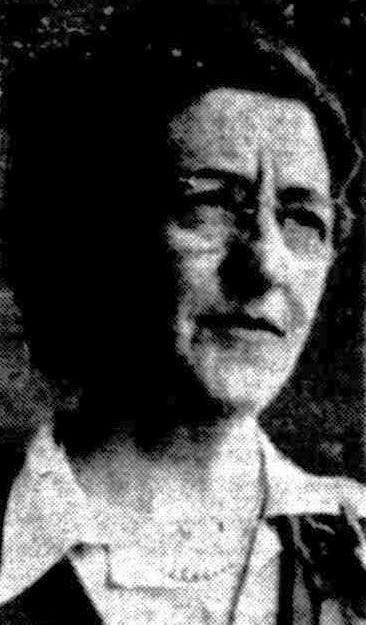 In consequence of typhoid, typhus, dysentery, tuberculosis and so forth, said Miss Doherty, the death rate was very high when she took over, but before she left it had fallen to ,what might be regarded as the normal death rate for a general hospital serving a large district, as by that time it was the hospital for the whole camp, which housed 3ome 26,000 displaced persons, not all of whom had been inmates of the horror camp. Her staff comprised 16 U.N.R.R.A. nurses representative of a number of Allied nations, plus Polish nurses, Lituanians and Estonians from among the displaced persons, and German nurses. Unfortunately, before long most of her most efficient German sisters were arrested as Nazis.
In consequence of typhoid, typhus, dysentery, tuberculosis and so forth, said Miss Doherty, the death rate was very high when she took over, but before she left it had fallen to ,what might be regarded as the normal death rate for a general hospital serving a large district, as by that time it was the hospital for the whole camp, which housed 3ome 26,000 displaced persons, not all of whom had been inmates of the horror camp. Her staff comprised 16 U.N.R.R.A. nurses representative of a number of Allied nations, plus Polish nurses, Lituanians and Estonians from among the displaced persons, and German nurses. Unfortunately, before long most of her most efficient German sisters were arrested as Nazis.
The patients were pathetically appreciative, she said, once well enough to realise that there was no need to hoard food for tomorrow, a habit which took a long time to break down and which had first resulted in the patients' beds being crammed with bits of food; they were unable to realise that they would be fed again next day.
Warsaw in Ruins.
After six months at Belsen, said Miss Doherty, she went to Poland, where her headquarters were at Warsaw, which was completely in ruins.
"I cannot believe," she said, "that any destruction could be worse. After the street fighting the whole city was mined house by house, street by street. It burnt for three months.
Right: MISS MURIEL KNOX DOHERTY.
The Ghetto was terrible; the Germans just poured petrol over the whole place and set it alight with the people still in it."
Everywhere in Poland, she said, there was a strong spirit of reconstruction. Pathetic efforts were being made to revive trades. Showcases were even fixed to lamp-posts. Women were cleaning bricks one by one in the streets and making anything and everything that they could to sell. A large proportion of the population of Warsaw was still living in cellars, and the health of the country was tragically undermined. It was not unusual to find a sufferer from advanced tuberculosis living underground in one room with eight other persons. The nursing profession, however, was doing a wonderful job. Underfed, underpaid and overworked, the nurses were struggling against overwhelming odds through insufficient money, accommodation, personnel and equipment despite all the assistance from U.NRR.A. Yet they were planning for the future, and already four schools of nursing had reopened. There were more applicants for the nursing profession than the training facilities could handle, although such a high standard of character and education was demanded. After her experiences in Germany and what she has seen in Poland, Miss Doherty feels no sympathy for the German people.
"I am convinced," she said, "that they are sorry for only one thing--that they lost the war-and regretful only of the damage that our air force did to their cities. They feel no pity; no other regrets." MATRON OF BELSEN. (
1946, September 16).
The West Australian (Perth, WA : 1879 - 1954), , p. 6. Retrieved from
http://nla.gov.au/nla.news-article46169919
Muriel spoke about conditions in Poland, and from the Wollstonecraft home - an indication Avalon was not ready to be moved into, or was used just as a weekender to begin with while she returned to her work - post war shortages of materials for building, has been spoken of by people who moved to Avalon Beach after WWII and features in articles of those years. Doug Crane, Doreen Cherry OAM, and even among the growth of areas like the Avalon and Palm Beach camping grounds were people waiting
to have
a home once they came home or get on with life if they had been too young to serve.
Her first priority was to returning to trying to establish something that had begun to be worked on prior to WWII:
Fighting matron leads big campaign for college of nursing
TO a Commonwealth-wide campaign for an Australian College of Nursing Matron Muriel Knox Doherty has enlisted the support of thousands of nurses in a whirlwind tour of four capital cities.
"Nurses all over Australia," she said yesterday, "are tired of waiting for reforms. They are ready to try and get them now for themselves."
The College of Nursing, Matron Knox Doherty said, would:—
Tackle again the recruitment of young girls as nurses.
Start pre-nurslng education, as in England, with optional courses in schools covering chemistry, physics, physiology, dietetics, for nursing.
Allow girls under 18 to do preliminary exams, which will help them and keep their Interest till they start.
Reorganise teaching of theory to nurses.
At present in hospitals they do lectures after a hard day's work, tired and strained. They should do this part of the course in a "block" in seven weeks' or so concentrated training at technical colleges.
Direct appointments
Country hospitals would not starve for nurses while city hospitals have plenty, if the college could direct appointments as well as Intake of trainees, she said.
"Through the college we can have proper diploma courses for tutor nurses. At present older nurses oblige in hospitals by giving lectures, except for' half a dozen who qualified to London.
"In each State are at least two nursing organisations, some have three. All our aims are the same. There will be no clash of Interest there, Mr. Kelly's promise
"We are not running counter to the Government In this," she said. "In 1943 Mr. Kelly announced that a nursing college would be founded in the future. Now is the time.
"I am Inviting each body of nurses — obstetric, departmental and staff, trainees, to submit their problems for a report which we want to present as soon as we can."
As far back as 1937 Matron Knox Doherty saw the drift of girls away from nursing in Australia and warned that bad conditions must be reformed. In 1942 she wrote to NSW Health Minister Kelly asking for appointment of a committee to overhaul nurses' conditions. A committee of 26 nursing, medical, and Education Department representatives sat Intermittently for nearly two years.
Never published
In 1944 the report was presented to the Health Minister. It was never published, she said. One urgent recommendation only was put into effect. A hospitals recruitment bureau was established. The recruitment bureau, she said, was closed in January, 1946, when the Hospitals Commission decided results were- not justifying expenditure. But for 18 months, she said, the bureau had been working in silence, because the publicity grant for advertising had been withdrawn by the Government. It had actually answered thousands of applicants, and had been closed just as the flow of women out of the services was ready to be directed to hospitals. Matron Knox Doherty came back five weeks ago from a year abroad with UNRRA. She was matron in charge of Belsen horror camp for the first six months of its reconstruction.
How May Day Is Spent Behind The Iron Curtain
BY MURIEL K. DOHERTY, who was Chief Nurse to UNRRA Polish Mission. She had previously been Principal Matron of the R.A.A.F. Nursing Service and later was in charge of the Belsen hospital for UNRRA.
ONE year ago last Thursday from a window in the Polonia Hotel, Warsaw, I watched some of the May Day celebrations.
I was anxious to see for myself just how the people' kept up this public holiday under the-"new democracy."
The Government loud-speaker system had been blaring since dawn instructing the people what they had to do about the day's programme. This loud-speaker system links every town and city with the capital, so that announcements can be made' throughout the country simultaneously and propaganda can be 'drummed continuously at the people, morning, noon, and night.
We passed Saski Platz, where each day for several weeks on our way to the UNRRA office in the Hotel Bristol we had seen an army of workmen feverishly preparing for these activities.
All around was stark ruin. Thousands were still hungry and living in cellars beneath the ruins, in old German dug-outs, or amongst the rubble. The badly damaged Platz had been repaired, new flagpoles, large opal electric lights, and-an imposing grandstand had been erected. Enormous mounds of rubble which had lain inert for 12 months or more suddenly disappeared overnight.
Red and white banners with exhortations in Polish were stretched across the streets and Communist and Socialist Party posters appeared everywhere, while slogans fluttered from every conceivable pole or corner. The red and white Polish flag with its still defiant eagle, stripped of his crown in January, 1945, fluttered from many buildings.
Although the day had been proclaimed a public holiday, all employees in Government offices, the Polish Red Cross, and the like were obliged to report to their offices in the morning to sign a paper stating that they would attend the celebrations. They also had to return afterwards to complete the document saying they had attended.
Those who had been in concentration camps had to report three times a day. Out of 130 workers in one establishment, only two wished to have the day off on those conditions. One woman was told by a senior official that she would be sorry for the consequences if she did not go. There is very little freedom from fear in Poland to-day.
We had been advised not to go near the Saski Platz that day.
For more than 200 years May 3 had been Poland's national day, and in this year of liberation the people had been looking forward to a happy anniversary, but now the Soviet-controlled Communist Government had forbidden any celebrations what-ever.
Although there appeared to have been activity all day, the big march began about 3 p.m. We had a good view of the assembly point. Boy Scouts and Girl Guides in uniform, members of young peoples' socialist clubs in blue shirts and red tics, boys and girls of the Communist clubs in white shirts and red tics, and Mikolajczyk's Peasant Party in the green of the fields, marched in endless columns, so reminiscent of the Hitler Youth.
There were a few tawdry floats and a number of spectacular caricatures were carried at the head of some of the groups of marchers. Mr. Churchill, with a large cannon replacing his cigar, played a prominent part. For some time, the Polish Communist-controlled Press had been carrying on a virulent anti-British and anti-American campaign.
Rifles and sub-machine guns, always in evidence in the streets, were at the ready, and were even seen on the house-tops. Of course, the secret police of the Public Security Ministry (nicknamed by the Americans- the Betsy Boys), as well as the Russian N.K.V.D., were at their posts.
There were speeches and bands, but no spontaneous cheering, and this regimentation all seemed artificial and dull. The majority of the spectators were in the khaki Polish uniform of the new Polish Soviet-trained army and were either Poles, Russians, or Yugoslavs. We heard afterwards that there were a number of incidents, which would mean that the already overcrowded prisons were strained to capacity.
Having lived behind the iron curtain for nearly six months, I came to the conclusion that no compulsory May Day celebrations would ever compensate these proud and freedom-loving people for the loss of their national independence. How May Day Is Spent Behind The Iron Curtain (
1947, May 5).
The Sydney Morning Herald (NSW : 1842 - 1954), , p. 2. Retrieved from
http://nla.gov.au/nla.news-article18024627
How Can We Overcome The Nursing Shortage?
By MURIEL K. DOHERTY, formerly principal matron of the R.A.A.F. Nursing Services, and later in charge of the Belsen Hospital for UNRRA.
The nursing profession in Australia faces to-day one of the greatest crises in its history. With unrest, dissatisfaction, and disunity within its ranks, and serious encroachment from without, the ideals of the profession are in imminent danger of dissolution.
WE will be unable to give the public the nursing services we have always undertaken to provide while we fail to hold our graduate nurses and to attract sufficient young girls of the right type to our profession.
To see just what is wrong, why young people are not interested, and where the remedy lies, we must look critically and honestly at the conditions for the graduate, and the training offered to the student nurse.
Are we offering the graduate nurse a status, salary, living and working conditions equal to those of women m other professions?
Are we using our graduate nurses for skilled nursing work only, and do we provide sufficient staff for them to carry out their duties efficiently'?
Is the nurse's health adequately supervised, and if she is living in, is her diet balanced, varied, and always well cooked and served?
Is there a retiring age for nurses, and, if so, are they in a position to enjoy this leisure free from anxiety as to their future''
What post-graduate opportunities have we in Australia for the nurse who wishes to qualify for higher teaching, administrative, or other specialised posts?
Status Of Nurses
Questions as to the status of the student nurse are these
Do the conditions offered for the study of nursing compare favourably with those of students in other professions?
Are parents interested in the profession as a career for their sons and daughters, and is the nurse in training for registration recognised primarily as a student in the science and art of nursing, or as an apprentice to a craft, and cheap labour for the hospitals?
Is our present system of nursing education established on modern lines to ensure sound teaching, facilitate learning, and maintain interest throughout the course?
Do we adopt an attitude towards the student nurse in keeping with the outlook of the girl of today, who has been accustomed to freedom of expression at school and at home, and does our system tend to stifle the development of her character and individualism, and lead to frustration, disillusionment, and discontent in too many instances?
Is our administration of student nurses' residences in keeping with hostels for young women studying for other professions? Would it not be better to appoint a welfare officer, experienced in dealing with young people, to take charge of such homes?
In my opinion, the remedy for the present situation lies in part in a drive to build up the nurses' status and the significance of the certificate of registration This certificate should be the hallmark of nursing (excluding the post-graduate Diploma of Nursing, which any outstanding nurse can obtain through study at one of the oversea universities)
Living Conditions
It is necessary also to ensure social and economic security and freedom of movement in institutional work, where the nurse should be encouraged to live out and be provided with a salary in keeping with graduates of other professions to enable her to enjoy social amenities commensurate with her status.
Where living facilities are not available within reasonable distance, blocks of flats and flatettes, lather than nurses' residences, should be available at reasonable rental for graduate nurses. Under our present hospital system there will, of course, be some who prefer, or find it more convenient or whose work makes it necessary for them to live in.
A greater proportion of graduate nurses to patients and to student nurses in training schools is required to relieve the increased pressure of work and heavy burden of responsibility undertaken it present by the majority of sisters, and to enable them to give that bedside teaching which only they through their years of experience are able to impart.
Graduate nurse specialists should be appointed to the New South Wales Hospitals Commission, all hospital boards and other committees dealing with the building of hospitals nurses residences, and other matters relating to nurses and nursing.
Possibilities for the establishment of post-graduate courses should be investi-gated, and negotiations opened up with the University authorities, with the object of establishing them in the future on a standard recognised overseas Nonacademic certificate courses for specialisation should be introduced without delay.
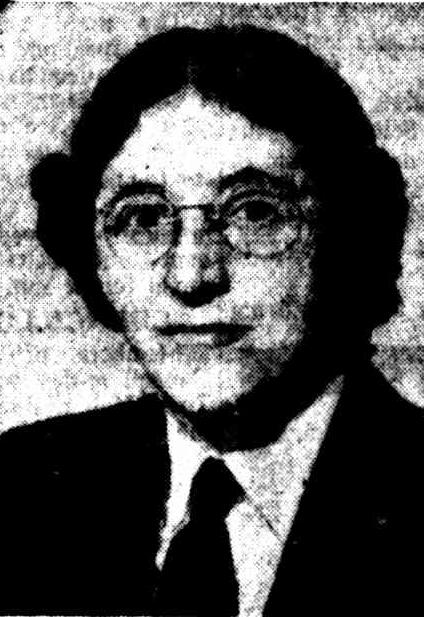 The removal of faulty methods of administration from committees of management downward, the more intelligent layout of hospitals, the preparation of rosters well in advance so that nurses know when they are on and off duty would do much to ensure contentment and a more normal way of life
The removal of faulty methods of administration from committees of management downward, the more intelligent layout of hospitals, the preparation of rosters well in advance so that nurses know when they are on and off duty would do much to ensure contentment and a more normal way of lifeConfidence is inspired by nursing staff conferences, in which all graduate nurses take part and at which problems affecting ad ministration, staff student nurses, and the like are freely discussed Such conferences also provide constructive criticism and an outlet for grievances and strengthen nursing administration Student nurses' representative councils enable the nurse in training to take an active part in nursing affairs
There are so many practical methods to attract more girls to the profession.
Extensive and intensive recruitment campaigns, planned and carried out throughout the State under the direction of trained nurses, should stimulate the interest of young people, their parents, and the public in nursing.
Specially designed pre nursing courses, either full or part time, at school or in the evenings in conjunction with the educational and technical college authorities, should be introduced without delay These courses have proved successful in maintaining schoolgirls' interest and in bridging the gap between the age of leaving school and taking up nursing when so many obliged to can become interested in other occupations and are lost to the profession. Grants and bursaries should be provided where necessary.
MATRON DOHERTY
If the final examination, at present taken at the end of the training, were divided into preliminary and final, so that the former could be taken at the end of the first year, a further division would be possible to allow part of the preliminary (in specified subjects) to be taken at school or before entering hospital Credits could be given, to count as part of the nurse’s training.
The establishment of regional preliminary schools serving groups of training hospitals throughout the State, which the student nurse would enter for six months or so before the age of 18, and through which every student would pass, would not only gradually introduce her to nursing and standardise the training but the syllabus covered would also count as part of the general training Financial assistance would also be necessary here.
The provision of one sister tutor (nurse teacher) to every 50 student nurses in a training school or group of training schools would raise the standard of nursing and prevent a great deal of wastage.
The insistence on hospitals registered as training schools providing the minimum classroom accommodation teaching facilities, and equipment and the appointment of practical nursing instructors would ensure that all students received the same standard of training, whether in the city or country.
The introduction of the block system in which the student is entirely relieved from ward duties for varying periods each year, during which she returns to the class-rooms for all lectures practical demonstrations, and examinations, is long over-due.
An expert investigation into the distribution of work in the wards the amount of work expected of the nurse in a given time, and the elimination of all domestic work after the preliminary period (when it ceases to be of educational value) would do much to improve the bedside nursing received by the patient, and make the training more interesting.
The introduction of a planned service of hospital domestics, the establishment of instruction centres where these young women would be trained scientifically, and the provision of labour-saving devices in all hospitals would go far towards raising the status of hospital workers, and relieve those nurses who are to day carrying out this work in addition to their own.
The provision of an adequate nursing service for the community is a national responsibility, but the nationalisation of nursing, with its imposed controls and restrictions as recently suggested by the Government, would make an already grave position worse A far-reaching proposal such as this, without reference to the recognised nursing associations, would not en-courage the co operation so necessary in any scheme for reconstruction The war-time man power control of nurses demonstrated how distasteful this method of staffing our hospitals proved.
Nursing affairs can be satisfactorily managed only by nurses themselves The majority of nurses in Australia feel that while it is vital that nursing should remain m the hands of nurses united in one non political body, representing all nurses with a common aim, it is also necessary for them to co operate closely with the Government.
The establishment of an Australian College of Nursing, with branches in each State capital, and regional branches throughout the country, is the first step in the resuscitation of the profession. Acting in an advisory capacity to the Minister for Health it would promote the advance of nursing as a profession in all its branches. How Can We Overcome The Nursing Shortage? (
1947, May 14).
The Sydney Morning Herald (NSW : 1842 - 1954), , p. 2. Retrieved from
http://nla.gov.au/nla.news-article18026093
LETTERS TO THE EDITOR
CONDITIONS OF NURSES
Patients' Welfare
Sir,-Ex-Matron suggests that, in my article on the shortage of nurses I have overlooked the patient.
On the contrary, it is because the patient is our first responsibility that 1 and many other nurses are gravely concerned at the present situation.
The main purpose of our profession is to promote the health of the community, nurse the sick, and alleviate suffering. Any plan to improve the training, living and working conditions of nurses must raise the standard of nursing care and attention received by the patient.
To retain our graduates and prevent wastage among our student nurses and to attract young men and women to our profession we must improve hospital staffing which is affecting so seriously the admission of patients to our hospitals today. Improving the hospital domestic situation would enable nurses to give full time to the care of their patients.
Undoubtedly conditions in some out-patient departments could be improved and the appointment of nurse specialists to commissions, boards, and committees dealing with hospital administration, planning and reconstruction, as I suggested, would do much to ensure that comfort and convenience was provided for the sick, the aged, and the crippled. To build new hospitals when we cannot staff the existing ones would be calamitous.
No suggestion has been made that large sums of money should be spent on building an Australian college of nursing, but nursing authorities have for many years made recommendations to the Government for the introduction of measures which would provide the public with an adequate and efficient nursing service. These plans would naturally entail a good deal of expenditure, but is not the health of the community worth that?
It is recognised that the establishment of an organisation to bring about unity, uniformity, contentment, and progress in the profession is long overdue. Australia is far behind the United Kingdom, New Zealand, and South Africa in introducing modern nursing reforms.
A college of nursing would not only contribute towards the material wellbeing of the patient, but through its activities would place our profession once more in the forefront of the nursing world to-day._
LETTERS TO THE EDITOR
COMMUNISM IN THE SADDLE
What This Means To Poland
Sir,-The Rev Dr C M Churchward is reported to have said that he supports "the sacred cause of Communism in so far as it is in harmony with the teachings of Jesus Christ "
I would suggest that Mr Church-ward would be enlightened could he visit one of the Soviet dominated European countries to day and see for himself what Communism stripped of its veneer really means to the masses
He would see how a group of party officials with absolute power, and directed from Moscow, implement the ideologies of socialism. He would search in vain for evidence of the freedoms for which the cream of our youth so recently sacrificed their lives.
If he were able to evade the Security (secret police trailing him he will soon sense others in the hotel, streets, and churches ready to follow on. He might even see a Soviet Army officer summon an apparently casual lounger and direct him to take the next table to him in the cafe
He may wonder how it is that the bureaucrats, with their streamlined cars, seem to have the best accommodation and eat only at the most expensive hotels, whereas the stricken, the aged, and the under-privileged struggle for existence He will be bewildered by the enslavemcnt of the worker and the steady and deliberate extermination of the intellectual.
He is sure to meet some whose loved ones, since 1939, have been deported to the Soviet Union and who have not been heard of since. Undoubtedly he will hear it whispered that thousands have been thrust into prison without warrant or trial, their only offence being that they opposed the regime-or perhaps not even that.
If he reads the language Mr Churchward will realise that the Press is controlled by the party, that the party has liquidated all opposition, and that an immense amount of lying propaganda is directed daily against the Western Democracies and their leaders.
He will learn of the exorbitant taxes, ridiculously low wages, endless restrictions and controls, and the everlasting fears imposed by the overlords of this "new dcmocracy". He will see the constant stream of people to the churches and will hear them imploring their God to deliver them from their intolerable sufferings
I venture to suggest that Mr Churchward having seen these things will himself in his compassion, join in prayer for the liberation of these oppressed peoples Having witnessed Communism in its stark reality, I am sure he will return filled with alarm and apprehension at the shadow of things to come which he will then recognise in his own country.
MURIEL . R. DOHERTY (UNRRA Mission to Poland, 1946). Wollstonecraft. LETTERS TO THE EDITOR (
1948, October 21).
The Sydney Morning Herald (NSW : 1842 - 1954), , p. 2. Retrieved from
http://nla.gov.au/nla.news-article18094849
LETTERS TO THE EDITOR
COMMUNISM IN PRACTICE
Poland's Experience
Sir,-If the Rev. Dr. C. M. Churchward did not make the statements exactly as attributed to him in my letter of October 21, the impression gained from what he has said is that he is gravely misinformed regarding the true facts of Communism in practice.
He states that my account of Communism in Poland is "utterly at variance with the evidence given by another eye-witness, Rev. Dr. Hewlett Johnson, the Dean of Canterbury." I am not in the least surprised at this, for I venture to suggest that the methods by which we gained our knowledge were also utterly at variance.
My experience came to me without seeking, during the grim task of relief among human beings irrespective of race, religion, or politics, first as matron of Belsen Hospital after the liberation of the German concentration camp in 1945, and later in Poland.
At Belsen I came into daily personal contact with thousands of displaced persons, many of whom had survived indescribable terrors under the Russian Communist as well as the German National Socialist regime! These people became a grave problem for the Allied authorities when, in spite of nostalgia and a burning desire to see once more those dear ones who still lived, they refused to return to their own country under Soviet domination. These homeless exiles to-day seek from the Western democracies that freedom and security which Communism cannot give.
In Poland for nearly six months I moved among people in all walks of life, employed and unemployed, party and non-party, in cities, towns, and villages; in institutions, hotels, and shops; in the streets and parks. They emerged from dark, dank, evil smelling hovels, underground earthy holes, and from the rubble. One could not avoid learning of their subjugation and of the injustices and discriminations of the party.
It was not of the poverty and devastation of a war-stricken country that those who had opportunity to do so complained (many acknowledged the efforts at reconstruction which were being made), but of their betrayal and their fears of the Communist dictatorship, of the Soviet occupation, and of the future from which they saw no escape. MURIEL K. DOHERTY. Wollstonecraft. LETTERS TO THE EDITOR (1948, October 27). The Sydney Morning Herald(NSW : 1842 - 1954), , p. 2. Retrieved from http://nla.gov.au/nla.news-article18091658
Did Matron Doherty pause or 'retire to Avalon' then? - No, she did not!
In 1916, as a Red Cross VAD volunteer working at the Prince Alfred Hospital, Miss Doherty had sighted a copy of Florence Nightingale's notes on hospitals, given to the hospital's first secretary in 1887 by this lighthouse of British nurses'. Aware of this work's proper place in the archives of the Prince Alfred Hospital, Muriel Doherty began to collect and preserve other historical documents about the RPAH.
One reflection of this early recognition and spark lit within he was the progression of nursing and the name of this famous nurse.
The National Florence Nightingale Memorial Committee of Australia was established in 1946 to support the development of post basic nursing education in Australia (the word Memorial was dropped by resolution in 1955). At the inaugural meeting in December of the National Florence Nightingale Memorial Committee of Australia she and Agnes Walsh were elected vice-presidents; Doherty was also elected convener of the education sub-committee. Muriel then helped to establish and became a foundation fellow, in 1949, of the New South Wales College of Nursing.
Another determination made years before finally realised.
In her private correspondence Muriel refers to 'hating publicity', didn't like a single photograph of herself that appeared in the Press, certainly didn't like newspapers such as 'The Truth', a polar opposite of news services such as the BBC or the more accurate, less sensationalised periodicals we too have here - but she kept speaking up, and out, with a clearly making sense voice.
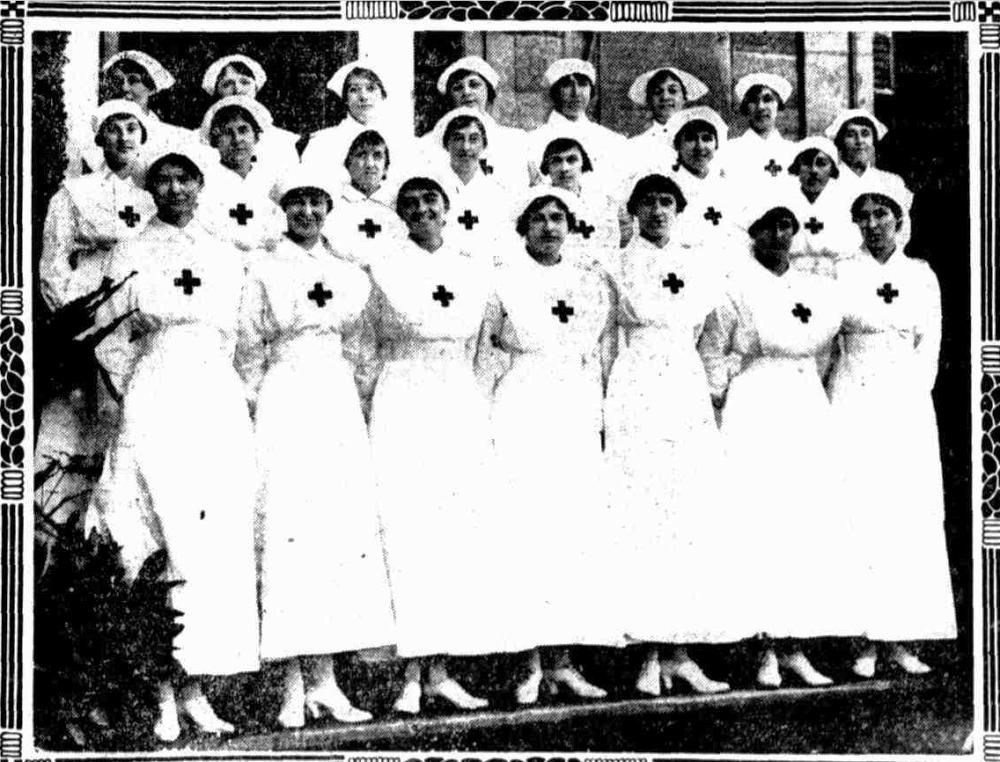
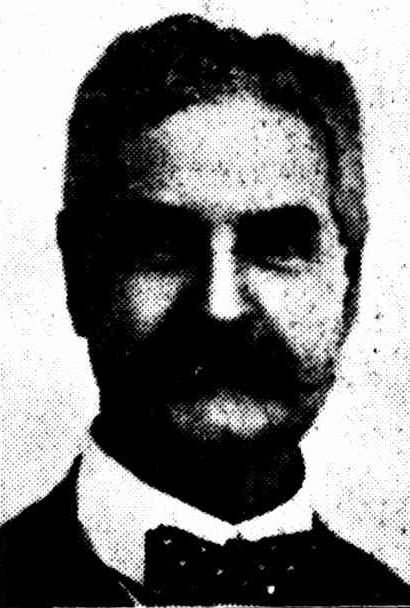 MR. R. K. DOHERTY.
MR. R. K. DOHERTY.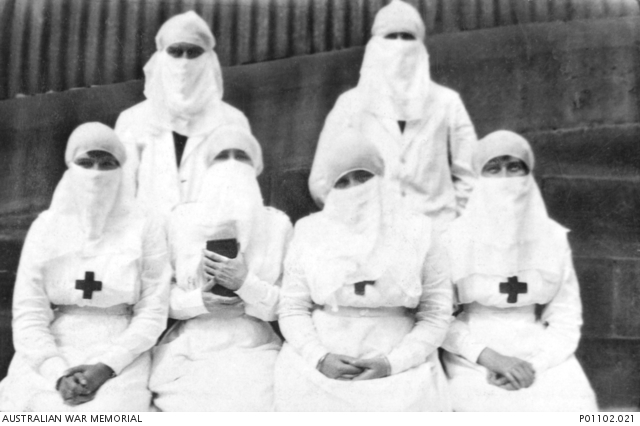
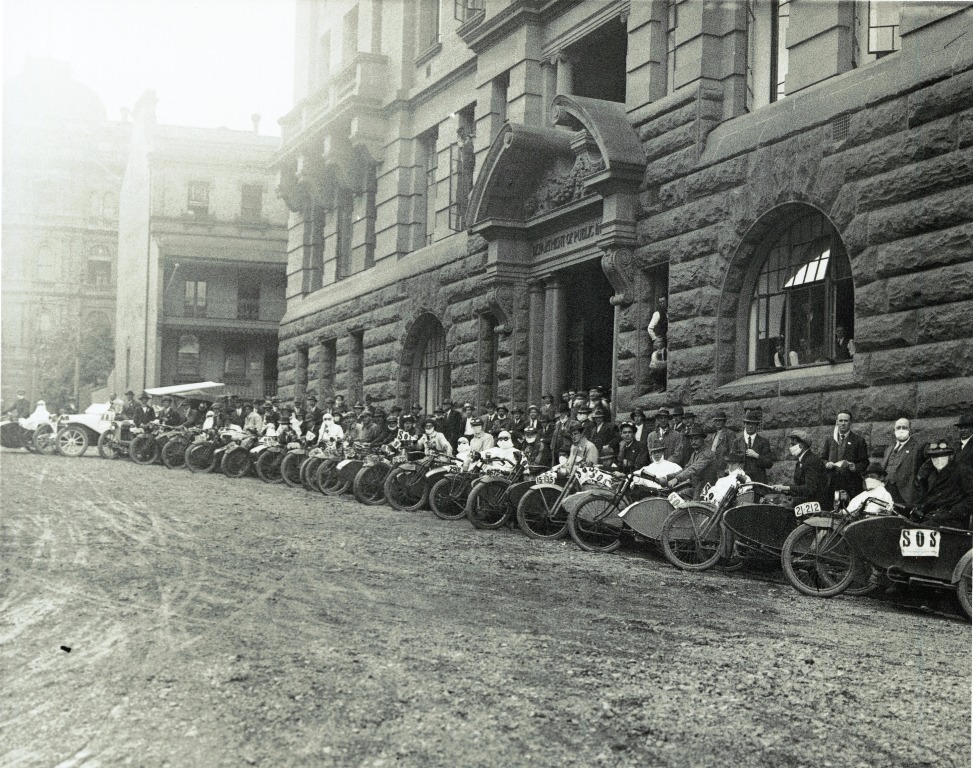
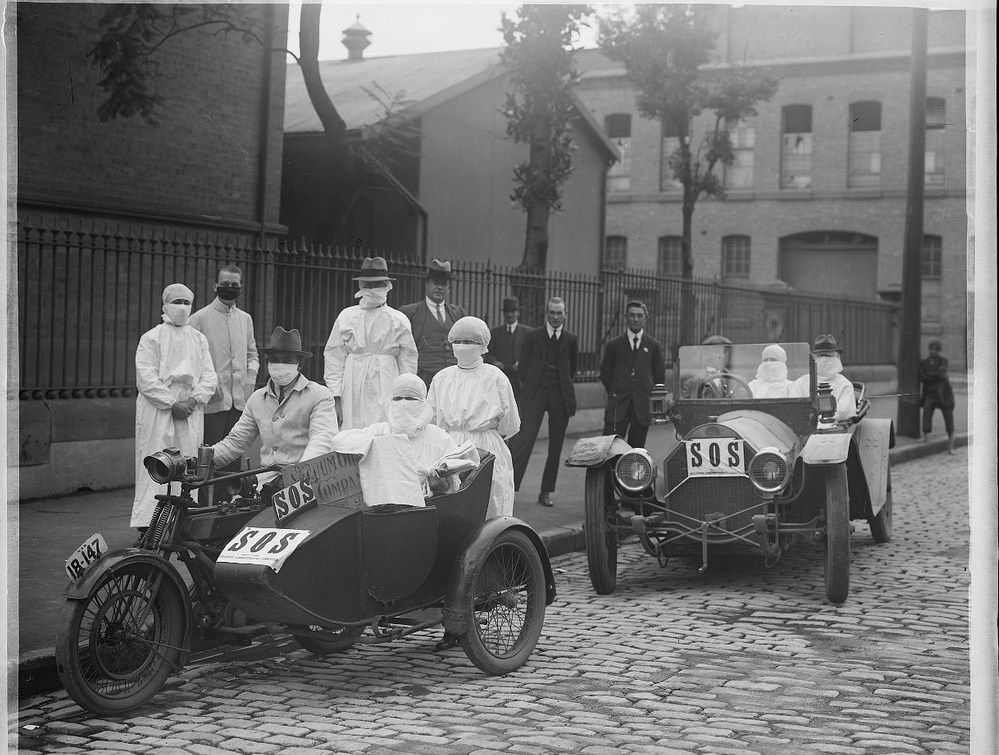
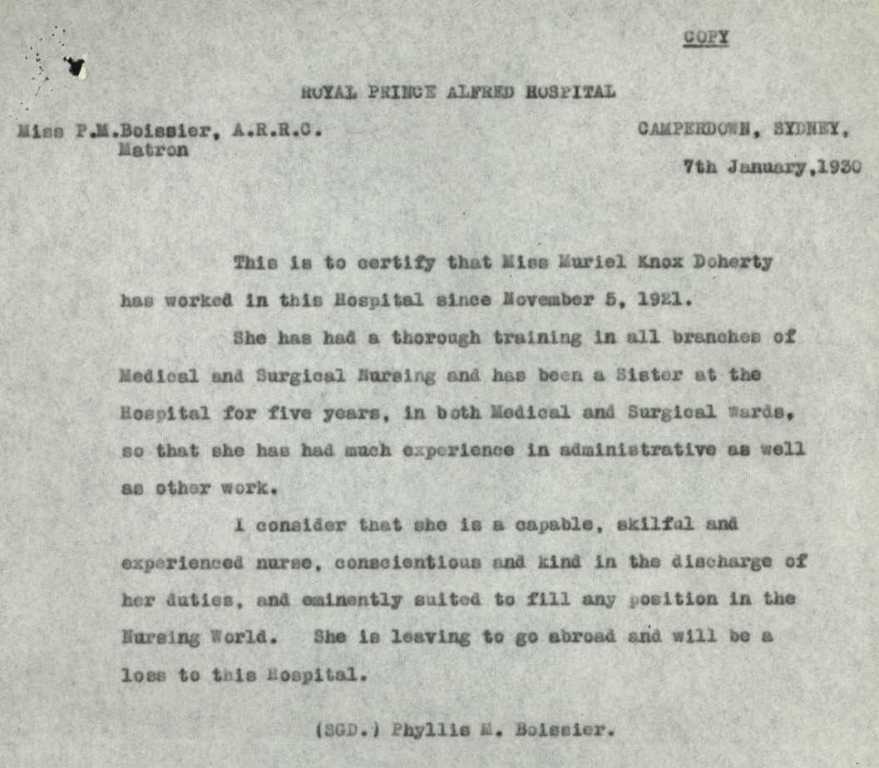
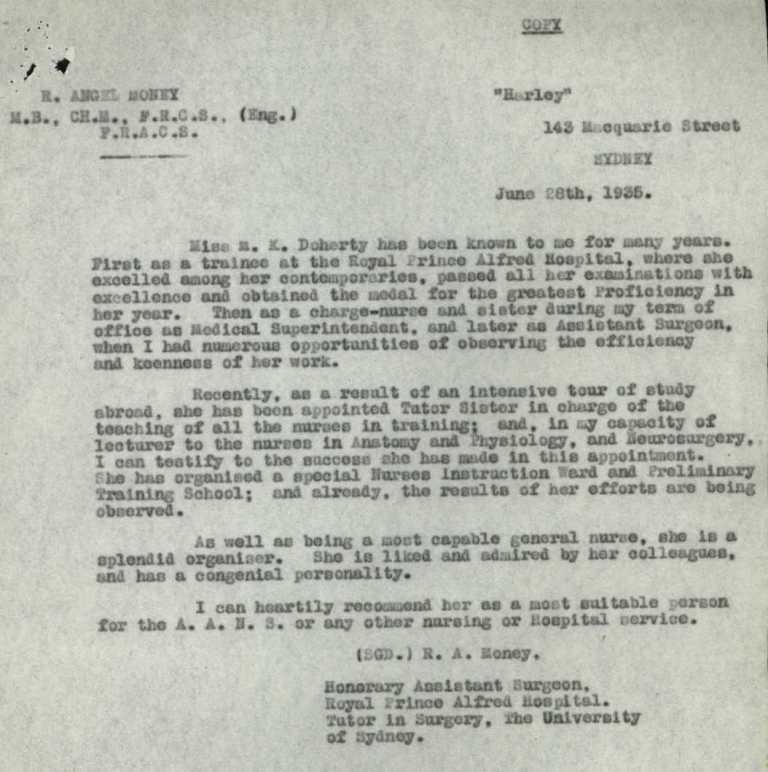
 R.A.A.F. NURSES.
R.A.A.F. NURSES.

 The Royal Red Cross is a military decoration awarded in the United Kingdom and Commonwealth for exceptional services in military nursing. The award was established on 27 April 1883 by Queen Victoria, with a single class of Member. A second and lower class, Associate, was added during World War I in 1917.
The Royal Red Cross is a military decoration awarded in the United Kingdom and Commonwealth for exceptional services in military nursing. The award was established on 27 April 1883 by Queen Victoria, with a single class of Member. A second and lower class, Associate, was added during World War I in 1917. The taint of evil is being erased from Belsen. Where once the horrors of the Nazi regime had full licence, the work of mercy is going forward.
The taint of evil is being erased from Belsen. Where once the horrors of the Nazi regime had full licence, the work of mercy is going forward. 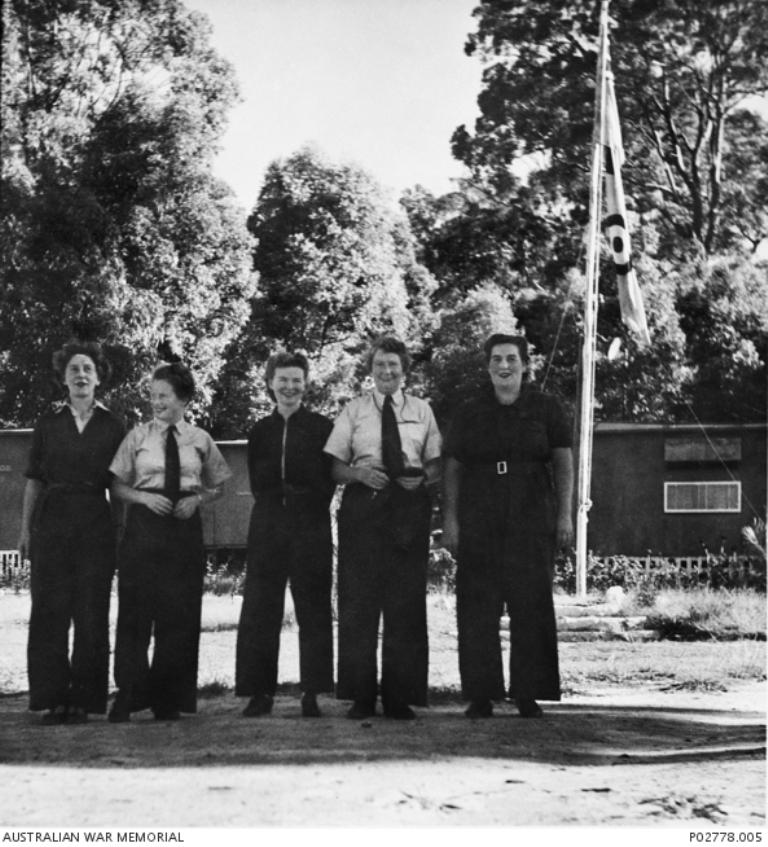
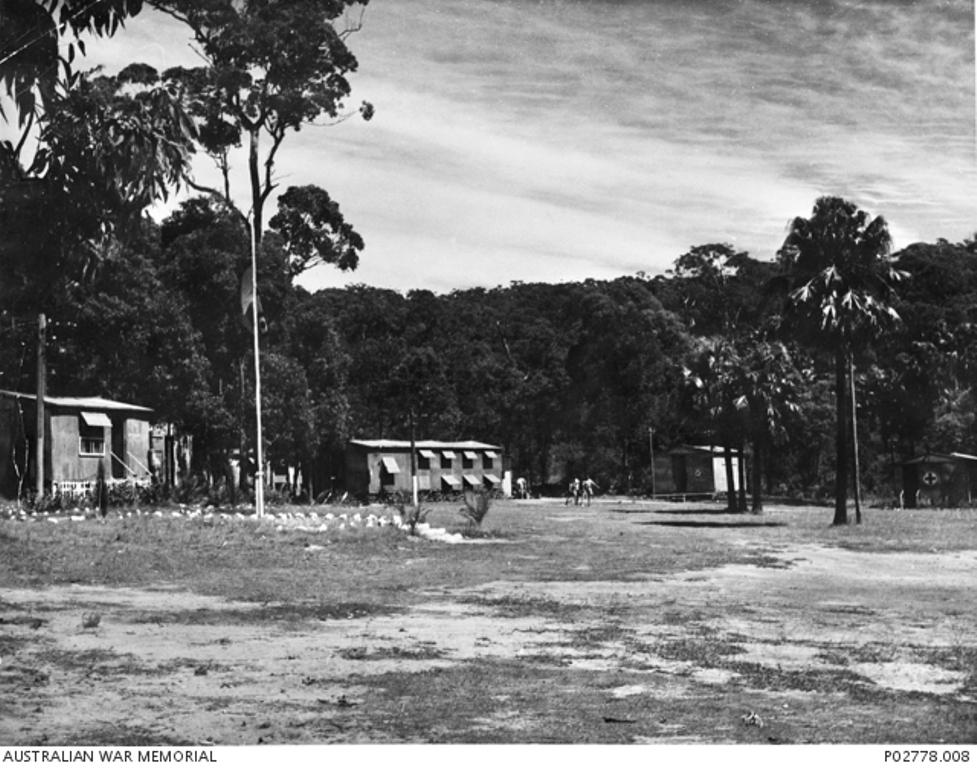
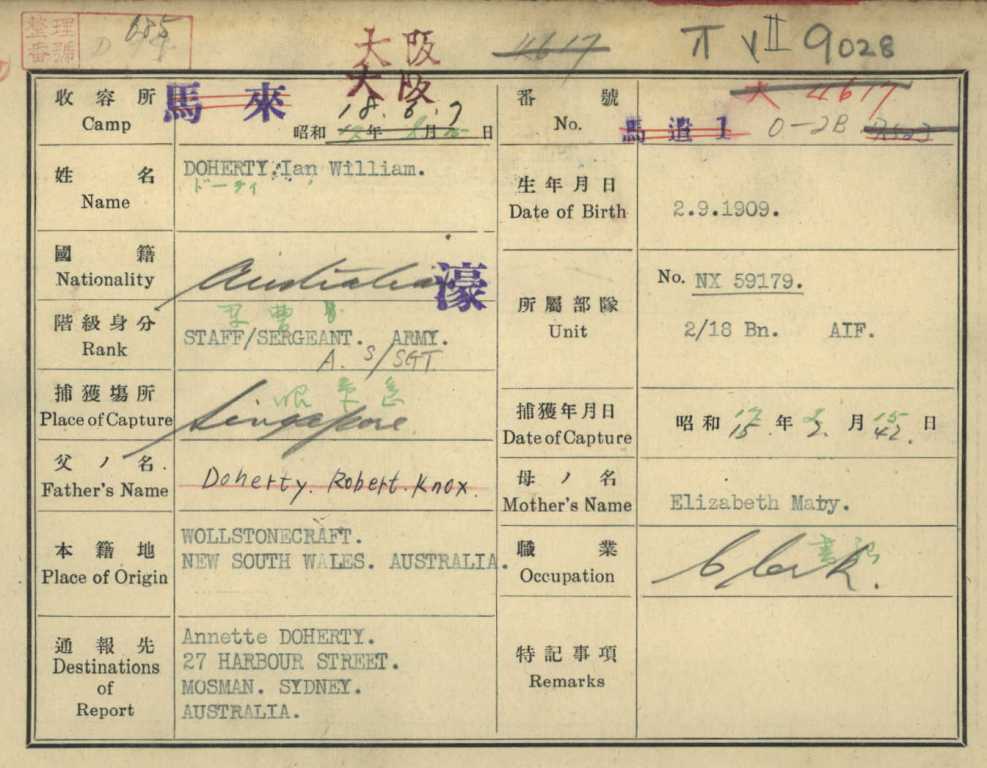

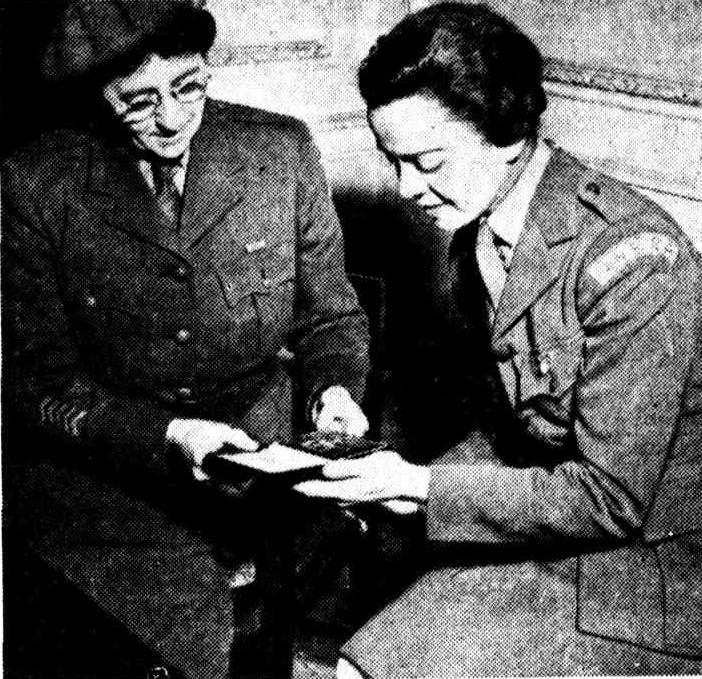
 In consequence of typhoid, typhus, dysentery, tuberculosis and so forth, said Miss Doherty, the death rate was very high when she took over, but before she left it had fallen to ,what might be regarded as the normal death rate for a general hospital serving a large district, as by that time it was the hospital for the whole camp, which housed 3ome 26,000 displaced persons, not all of whom had been inmates of the horror camp. Her staff comprised 16 U.N.R.R.A. nurses representative of a number of Allied nations, plus Polish nurses, Lituanians and Estonians from among the displaced persons, and German nurses. Unfortunately, before long most of her most efficient German sisters were arrested as Nazis.
In consequence of typhoid, typhus, dysentery, tuberculosis and so forth, said Miss Doherty, the death rate was very high when she took over, but before she left it had fallen to ,what might be regarded as the normal death rate for a general hospital serving a large district, as by that time it was the hospital for the whole camp, which housed 3ome 26,000 displaced persons, not all of whom had been inmates of the horror camp. Her staff comprised 16 U.N.R.R.A. nurses representative of a number of Allied nations, plus Polish nurses, Lituanians and Estonians from among the displaced persons, and German nurses. Unfortunately, before long most of her most efficient German sisters were arrested as Nazis.  The removal of faulty methods of administration from committees of management downward, the more intelligent layout of hospitals, the preparation of rosters well in advance so that nurses know when they are on and off duty would do much to ensure contentment and a more normal way of life
The removal of faulty methods of administration from committees of management downward, the more intelligent layout of hospitals, the preparation of rosters well in advance so that nurses know when they are on and off duty would do much to ensure contentment and a more normal way of life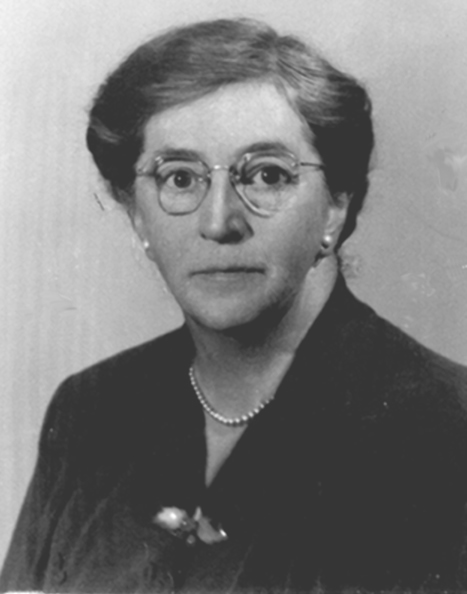 Nurses Training
Nurses Training